






Colliers Securities offers a robust foundation in serving the needs of non-profits, units of state and local government and other tax-exempt entities.
For over 40 years we have served South Dakota’s local and state governments, school districts, counties and cities, underwriting over $6 billion in bonds for South Dakota public entities since 1990.
We look forward to serving your public finance needs!

Tom Grimmond
Sioux Falls, South Dakota
Phone
605.339.9800 | 800.339.1111 tom.grimmond@colliers.com

colliers.com find us under services

Toby Morris
Pierre, South Dakota
Phone
605.224.5557 | 877.224.5557 tobin.morris@colliers.com
SARA RANKIN | SDML EXECUTIVE DIRECTOR

Being an elected official is a big responsibility. People choose you to represent them and make decisions that affect everyone in your community. First and foremost, it's about trust. People trust you to speak for them and make decisions that are fair and right.
The job isn't easy. You must understand lots of different issues and work at finding solutions that fit for everyone, even when people disagree. As an elected official, you're not just a rule maker—you're a change maker. You work on laws and policies that make life better for people. This might mean better schools, safer roads, or protecting natural areas.
Above all, being an elected official is about serving others. It means being honest, listening to people's concerns, and working together to make your community a better place.

In the end, being an elected official is more than just a job. It's a chance to make a real difference and leave a positive mark on your community.
We want to take a moment to say a huge THANK YOU to all our elected leaders. Your hard work and dedication make a real difference in your communities every day. You tackle tough problems with tenacity and find solutions that benefit everyone. Whether it's concerns around infrastructure, supporting local businesses, or navigating budget constraints, you're there for your communities.
Your leadership brings your citizens together, making your community stronger and more united. By listening to your constituents and working with others, you create a sense of belonging appreciated by all. Your legacy of service inspires folks to be better citizens. We're grateful for your commitment to making our towns better places to live.
Thank you again for everything you do for us. We're proud to have you leading our communities forward.
– Sara


PRESIDENT
Harry Weller Mayor, Kadoka
1st VICE PRESIDENT
Carolynn Anderson
Finance Officer, Wall
2nd VICE PRESIDENT
Leland Treichel
President of the Board, Roscoe
TRUSTEES
David Barranco
Councilmember, Sioux Falls
Paullyn Carey
Finance Director, Huron
Michelle DeNeui
Finance Officer, Spearfish
Lance Lehmann
Councilmember, Rapid City
Dawn Murphy
Finance Officer, Tea
PAST PRESIDENT
Amy Leon
City Manager, Yankton
Sara Rankin
DISTRICT CHAIRS
Dist. 1 | Mike Grosek Mayor, Webster
Dist. 2 | Jameson Berreth
City Administrator, Madison
Dist. 3 | Derick Wenck Mayor, Harrisburg
Dist. 4 | Chandra Phillips
Finance Officer, Winner
Dist. 5 | Kristi Honeywell, City Administrator, Pierre
Dist. 6 | Rick Boschee
Mayor, Bowdle
Dist. 7 | Gary Weismantel Mayor, Herreid
Dist. 8 | Brittany Smith City Administrator, Philip
Dist. 9 | Laurie Woodward City Administrator/Finance Officer, Custer
Dist. 10 | Adam Hosch Finance Officer, Sturgis
Executive Director
Vacant Director of Member Engagement
Emilie Miller Director of Marketing and Communications
Lisa Nold Director of Risk Sharing Services
Lori Butler Director of Finance
Jackie Lopour Accounting Assistant
Rob Peterson Director of Municipal Electric Services
Krista Kerns Administrative Services Coordinator
SD Public Assurance Alliance
Lynn Bren
Executive Director
Kristina Peterson Deputy Director
Becky Brunsing Member Services Representative
Jerry Krambeck Member Services Representative
Paytra Nichols Underwriter
HARRY WELLER | SDML PRESIDENT

You would think after all these years as the Mayor of the City of Kadoka, I would have a handle on various things. It seems it's that time of year when people start to complain - whether it's weeds, barking dogs, dogs running around at large, feral cats, unsightly property, annoying potholes, or water rates. Let's not forget grasshoppers and mosquitoes. It seems there is a season for complaints and Kadoka is no different.
If you're still reading, you’re probably thinking that I should get out of the kitchen if I can't take the heat. Don’t get me wrong – I’m not complaining about complaints. Our residents have the right to (and should) come to us whenever a solution to the problem is in sight. I’m a believer that no problem is so big it can't be solved. Some just take longer.
Congratulations to Chad Tomjack, Box Elder, for being named Code Enforcement Officer of the Year in May and Roxanne Heezen, Fort Pierre, for being named Finance Officer of the Year in June. These two are excellent examples of the many outstanding public servants we have throughout the state.
We’ll have two more opportunities to recognize excellence this fall at the annual conference. The SDML Hall of Fame honors those with long-term (20 or more years) of municipal service. The prestigious Excellence Award will recognize a municipal employee for their outstanding contributions to their community. Nominations for both honors are open now at www.sdmunicipalleague.org. Don’t delay; nominate someone great.
Let's keep the people of Southeast South Dakota in our thoughts and prayers as they continue the long process of recovering from early summer flooding. The loss of property and life's keepsakes are hard to replace. My wife and I lost a home to a lightning strike during an August thunderstorm 15 years ago. Still seems like yesterday. Again, some problems just take longer to solve. But you’ll get there.
– President Harry


























BECKY BRUNSING






One thing that comes to mind when I think of the South Dakota Municipal League is: “They got your back!” As city dynamics change - whether it be law changes, employee changes, or council changes, the SDML is always there to help you!








I began my municipal government career in 2002 as a newly hired fi nance offi cer for the City of Wagner. I had no idea what I was doing or what this job was about. As I learned the basics of municipal government operations, becoming more confident, I wanted to learn more. That is where the South Dakota Municipal League came in. By attending training and schools, I was able to make connections with people across the state to help me bring back ideas on how to handle situations or move forward on projects for Wagner.










I was eager to jump in and learn, so I joined the SDML Board of Directors, serving 2006-2015 and then again 2016-2022. I had the honor of serving as president of the SDML in 2013-2014. I served on the General Government and Audit Committee, as well as the SD Governmental Finance Officers Association Board, serving as president of that association in 2011-2012. I also served on the SD Public Assurance Alliance Board from 2017-2022.


I have attended many Finance Officer Schools and SDML Annual Conferences, but one of the earliest memories I have as a new finance officer was meeting Al Cerney from Gregory. Al became my mentor, whether he wants to admit that or not. :) In my eyes, he held great wisdom and knowledge; he always knew where to go to get answers or could at least put me in touch with someone that had the same problem or concern. Jim Preston was also a person that would take aside one of the newbies and get them involved in SDML committees or boards.















I think one of the biggest accomplishments of the finance officer group happened at a meeting in a conference room at the AmericInn in Chamberlian in 2005. There was no air conditioning, and we were all crammed into this small room to talk about the much-needed education and training for human resources for our cities. As a result of that meeting, the SD Governmental Human Resources affiliate was born! I remember as I looked around the room, being so proud that all the people there wanted to be able to help other finance officers and cities across the state. Taking on the creation of this new affiliate was going to be work, but it would be worth it in the end for public servants across the state!
























Over the years there have been so many fun League stories and events! Some of my favorites would be: the SDML District Meeting Road Tour with Yvonne and crew when I was League
































President, hosting the SDML Board with a pontoon boat ride on the Missouri River, the tour of a B-1 Bomber at Ellsworth in 2019 with the SDML Board, the Annual Conference in 2021, “Twice the Fun in 2021;” and Yvonne’s farewell party at the Annual Conference in 2022. Also, I must mention the endless memories with some of my favorite people - just a few pictured here - that will be my forever friends for a lifetime!








Mid-2022, I left the City of Wagner to embark on a new adventure as Member Services Representative for the South Dakota Public Assurance Alliance. I have been so blessed to have this opportunity to work with a great team and continue to serve public entities. AND the best part of it is that I continue to get to see and connect with all the wonderful people that helped me to be the best finance officer that I could be. Now I strive to help them in a different capacity.











In closing, there will always be ups and downs in municipal government. Lean on the people across the organization that you have met and have helped you when you needed it. And remember, there is one entity that you can count on no matter what - the SDML! They are here to connect, educate, and advocate to help you grow your city!




















- Becky



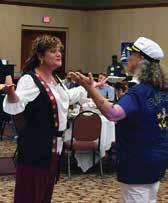

























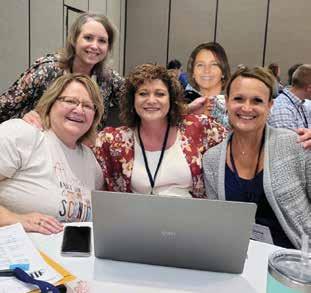

















In the heart of Madison, South Dakota, the First Bank & Trust SportsPLEX stands as a beacon of community collaboration and transformation. This 13,000-square-foot facility offers diverse sports activities for all ages and skill levels, including batting cages, archery lanes, golf practice turf areas, and agility training spaces. Before a concerted effort from the community, the property was overlooked, hazardous, and viewed as an eyesore. From vision to victory, the First Bank & Trust SportsPLEX is a testimony to the power of collaboration, perseverance, and thinking outside the box.
In 2021, the relocation of the Runnings retail store left a large property vacant in the heart of Madison. The City of Madison, recognizing the potential of this neglected space, collaborated with the Lake Area Improvement Corporation (LAIC) to explore possibilities for community enrichment. The LAIC, an economic development organization (EDO) committed to enhancing Madison, recognized the potential benefits and proactively spearheaded the project.
The LAIC, the City of Madison, and other community stakeholders held discussions that identified a particular need and a promising opportunity

for the property. These discussions led to the conceptualization of the SportsPLEX, an indoor recreation facility that could provide a variety of activities for youth and adults right in Madison.
The proposed plan envisioned the LAIC spearheading the initial preparation and development of the property and facility. As an EDO operating independently of the City of Madison, the LAIC was better equipped to work more nimbly and adaptable to

convert the existing property into the SportsPLEX. Upon completion of this groundwork, the City of Madison would assume ownership responsibilities, ensuring ongoing maintenance and long-term sustainability of both the property and the facility. This strategic collaboration aimed to create a seamless transition from development to sustained community benefit.
With the vision created, LAIC approached Runnings about donating the property. Runnings generously agreed and donated the property to the LAIC in 2022, igniting the property's transformation.
The property, situated in a floodway and plagued by weeds and dilapidated buildings, demanded meticulous planning and innovative solutions to cost-effectively meet building standards. The LAIC strategically decided to preserve the building closest to the street, which was highly
visible and in satisfactory condition. Two other long-neglected structures would be removed after tackling the asbestos and mold removal challenges. These changes significantly improved the area's appearance and set the stage for successful progression in the SportsPLEX concept.
One of the most significant challenges was implementing access to the facility. Early on, the City decided that it desired to operate the facility without staff on site. The goal was to avoid hiring more staff while minimizing the increased workload of City employees. After some painful efforts, software was identified that provided modern technology solutions to meet the goal of a crewless facility. The user-friendly app allows patrons to reserve time slots, pay for reservations, and access the facility all on their own. Cameras were
can assist with reservation questions as needed, and employees in the parks department are responsible for facility cleaning and maintenance.
Effective management and sustainability of the facility were also significant concerns, especially with deteriorating sewer pipes and leaky roofs. The LAIC exercised careful oversight and innovative problem-solving to address these issues within a tight budget.
Despite these difficulties, the community's determination remained unwavering. For every obstacle, new solutions emerged, propelled by a collective will to succeed. Support from a united community and dedicated stakeholders was crucial in overcoming these challenges.
confidence in the project's value and potential to improve Madison's quality of life. In September 2023, First Bank & Trust and FirstLine Funding Group announced their partnership with the LAIC for sponsorship and exclusive naming rights of the SportsPLEX. First Bank & Trust's pivotal sponsorship demonstrated its commitment to the community and dedication to supporting Madison's growth. In total, 19 sponsors provided financial support and countless in-kind contributions to make the facility conversion possible.
Additionally, volunteers played crucial roles in every phase, from demolition cleanup and site preparation to brainstorming sessions and equipment installation. The City and LAIC used a central group of community partners and volunteers to assist with operational planning, such as preparing an initial


volunteers, and forming facility rules. Their meticulous attention to detail and commitment to safety showcased their dedication to creating a secure and functional environment.
"The collaboration between volunteers and sponsors showcased the community's collective effort to bring the SportsPLEX to life. Their dedication ensured the project's completion and highlighted the power of communitydriven initiatives,” said Brooke Rollag, Executive Director of LAIC. “This project truly symbolizes the achievements possible when a community unites and reinforces a sense of pride and accomplishment that will resonate for generations."
City Involvement and Facility Opening
The City of Madison was deeply involved throughout the process, working alongside the LAIC to ensure the successful launch and maintenance of the facility. City departments, particularly the parks department, contributed significantly through painting and cleanup efforts.
Once LAIC completed the SportsPLEX conversion, the City purchased the
property for the expense of the demolition of the dilapidated buildings. The combined efforts of the LAIC, sponsors, and volunteers fully funded the costs of converting the SportsPLEX building.
"Together, we transformed a neglected property into a vibrant hub of activity and unity, showcasing the best of what Madison has to offer,” said City Administrator Jameson Berreth. “The SportsPLEX is more than just a facility; it symbolizes our city's resilience, ingenuity, and unwavering commitment to growth and prosperity for all."
In early 2024, the facility opened to local youth sports teams for spring training. The soft launch allowed the City of Madison to refine operations and finalize solutions for a successful full-scale opening. Once the mobile app was ready, the entire facility was open to the public. Anyone, whether a resident or visitor to Madison, can easily walk up to the facility, read the instructions for access, and download the app. In a matter of a few minutes, they can be in the building and swinging a bat or club or releasing an arrow.
The First Bank & Trust SportsPLEX isn't just about sports and recreation; it's a hub that keeps athletes and their families in Madison, supporting local businesses through increased spending on dining, fuel, and other services. The facility attracts visitors from surrounding areas, injecting vitality into the city's economy and contributing to its growth. This, in turn, boosts economic resilience by creating a ripple effect of activity throughout the community.
The community impacts extend beyond economic growth. The SportsPLEX promotes regular exercise, combating health issues like obesity and diabetes, which are more prevalent in rural areas. Physical activities also offer mental health benefits, such as stress reduction, improved mood, and enhanced cognitive function, contributing to a healthier population and decreased healthcare costs.
Furthermore, the facility fosters youth engagement and development, helping young athletes cultivate essential skills like teamwork, discipline, and community spirit, mitigating juvenile delinquency and poor health issues.
By revitalizing the neglected areas and improving the community's appearance through the strategic use of existing resources, the City of Madison enhanced the quality of life for its residents. Bringing the project and its impact on the City of Madison full circle, this improved quality of life attracts skilled workers and businesses, driving a robust and sustainable local economy.
The First Bank & Trust SportsPLEX celebrated its grand opening with a ribbon cutting and open house on July 9, 2024. Berreth reflected on the project's impact: "The First Bank & Trust SportsPLEX is a huge win for everyone in our community. There is no better example of collaboration. Together, we were able to take an eyesore and turn it into an asset. We used existing infrastructure and resources to build something that improved Madison's quality of life, which can be used by current residents and visitors as well as generations to come. In the end, leaving our community better than we found it is what public service is all about." ■
Redirect personal issues away from work and to helping resources.
• Legal
• Financial
• Substance Abuse Counseling

• In-person Counseling
✓ Marriage & Family issues
✓ Anxiety & Depression
✓ Post-Traumatic Stress
✓ Mental Health
Call today: 1.800.779.6125
info@connectionseap.com
www.connectionseap.com






























































































































South Dakota Municipal League (SDML) President Harry Weller has announced the members of this year's four policy committees, who are charged with the annual review of the association's official Statement of Policy.
"Thanks to all these folks who have stepped up to serve on these committees," Weller said. "I know they’ll use their experience and know-how to create a well-rounded, impactful policy statement for the League."
The policy statement guides the League staff and lobbyists during the legislative session and functions as a reference for the League’s position on various issues affecting local government.
“While the committee members will be the organizing force behind the policy review, don’t forget how important member input is,” said Weller. “Let your voice be heard. It’s an important part of the process.”
The current Statement of Policy can be found in its entirety online at sdmunicipalleague.org/about-statementofpolicy.


Members can submit their suggestions online or by contacting the appropriate committee members directly. Suggestions may also be brought up from the floor during the annual business meeting Oct. 11.
The committees will meet Aug. 14 and 15 at the SDML office in Fort Pierre to review submissions and recommend changes to the Statement of Policy.
Recommendations are then submitted to the Resolutions Committee, which reviews and prepares them for vote at the annual SDML business meeting in October before being adopted into the official policy. ■
View current policy and submit suggestions online



Covers: Municipal legislative issues, executive municipal policy, elections, and financial administration. Examples include: General statements of policy, personnel administration, bid laws, elections, open meetings, qualifications for office, employee benefits, insurance issues, intergovernmental cooperation and relations, and alcoholic beverage policy.
Chair: Paullyn Carey, Finance Officer, Huron
Vice Chair: Kristi Honeywell, City Administrator, Pierre
Jamison Berreth, City Administrator, Madison
Gary Blue, City Attorney, Wessington Springs
Patrick Dame, Airport Manager, Rapid City
Vicki Fisher, Community Development Director, Rapid City
Jason Foote, Police Chief, Yankton
Clayton Fosheim, Trustee, Midland
Shaun Frost, Councilmember, Hoven
Lajena Gruis, Mayor, Onida
Gloria Hanson, Mayor, Fort Pierre
Jenna Harris, Policy Advisor, Sioux Falls
Rich Holland, Councilmember, Vermillion
Debbie Houseman, City Administrator, Wagner
Jason LaFayette, City Manager, Belle Fouche
Amy Leon, City Manager, Yankton
Dawn Murphy, Finance Officer, Tea
Oepke "Ope" Niemeyer, Mayor, Brookings
Bill O'Toole, Human Resources Director, Sioux Falls
Cody Papke, Chief Accountant, Sioux Falls
Kristi Pritzkau, Finance Officer, New Underwood
Bryan Read, City Administrator, Brandon
Peg Ryan, Councilmember, Custer
Michael Schulte, City Administrator, Volga
Lindsey Seachris, Councilmember, Rapid City
Derek Sinner, Councilmember, Webster
Misty Summers-Walton, Finance Officer, Hot Springs
Richard Thomason, Councilmember, Sioux Falls
Donna Van Hout, Finance Officer, Valley Springs
Paula Wagner, Trustee, Brant Lake
Covers: Police, fire, protective inspections, ambulance, health, hospitals/nursing homes, drug education, humane society, mental health, culture and recreation, parks, libraries, museums, historic preservation, and economic development.
Chair: Brittany Smith, City Administrator, Philip Vice Chair: Steve McFarland, City Administrator, Dell Rapids
Jessica Bahmuller, Finance Officer, Alexandria
Miranda Basye, Councilmember, Sioux Falls
Dr. Sarah Cole, Councilmember, Sioux Falls
Jon Cole, Mayor, Vermillion
Jason Foote, Police Chief, Yankton
Mike Glover, Finance Officer, Burke
Laurie Gronlund, Human Resources Director, Pierre
Lisa Marso, City Attorney, Brandon
Shauna Meyerink, Finance Officer, Platte
Curt Soehl, Councilmember, Sioux Falls
Geody VanDewater, Police Chief, Sturgis
Laurie Woodward, Finance Officer, Custer
Jerry Zeimetz, City Administrator, Beresford
Covers: Property taxes, sales taxes, licenses and permits, intergovernmental revenue (federal/state grants and loans), state shared revenue (bank franchise tax, motor vehicle registration fees, liquor taxes, fire insurance reversion), and 9-1-1 surcharge.
Chair: Daniel Ainslie, Finance Director, Rapid City
Vice Chair: David Bixler, City Counsel Budget Analyst, Sioux Falls
Meri Jo Anderson, Finance Director, New Underwood
Carolynn Anderson, Finance Officer, Wall
David Barranco, Councilmember, Sioux Falls
Aerial Bochmann, Finance Officer, Hot Springs
Paul Briseno, City Manager, Brookings
Al Cerny, Mayor, Gregory
Jon Cole, Mayor, Vermillion
Jim David, Operations/Legislative Manager, Sioux Falls
Stephanie Ellwein, City Administrator, Mitchell
Adam Hosch, Deputy Finance Officer, Sturgis
Lori Huemiller, Finance Officer, Salem
Callie Iverson, Councilmember, Fort Pierre
Jordan McQuillen, Finance Officer, Aberdeen
Rich Merkouris, Councilmember, Sioux Falls
Steve Pendergrass, City Administrator, Milbank
Kyle Peters, Councilmember, Watertown
Andrew Pietrus, City Administrator, Harrisburg
John Prescott, City Manager, Vermillion
Tobias Schantz, Finance Officer, Crooks
Travis Schaunaman, Mayor, Aberdeen
John Senden, Mayor, Spearfish
Jennifer Sigette, Councilmember, Sioux Falls
Linda Willman, Finance Officer, Wessington Springs
Covers: Streets, sanitation, water, planning and zoning, electricity, airports, telecommunications, parking, and cemeteries.
Chair: Justin Weiland, City Administrator, Tea
Vice Chair: Craig Wagner, Public Works Director, Hartford
Blake Barringer, Commissioner, Pierre
Robin Bobzien, City Manager, Aberdeen
Mark Cotter, Public Works Director, Sioux Falls
Tracy Davis, Deputy Finance Officer, Rapid City
Mike Glover, Finance Officer, Burke
Russell Halgerson, Electric Superintendent, Brookings
Susan Hargens, Councilmember, Miller
Pete Jahn, Street Superintendent, Vermillion
Adam Jans, Finance Officer, Parker
Terry Johnson, Engineering Projects Supervisor, Mitchell
Drew Johnson, City Attorney, Groton
Sharon Martinisko, Commissioner, Deadwood
Stu Nelson, Public Works Director, Aberdeen
Ryan Spellerberg, Councilmember, Sioux Falls
Dale Tech, Public Works Director, Rapid City
Heath VonEye, Public Works Director, Watertown
Harry Weller, Mayor, Kadoka
In nearly 20,000 cities and towns across America, elected council members swear to fulfill their duties “faithfully and impartially.” The exact words vary, but the oath of office signals a shift from “campaign mode” to the responsible work of governance in a representative democracy.
As a professional facilitator and mediator, I’ve witnessed countless examples of negative attitudes and behaviors that obstruct productive teamwork and healthy disagreement,
whether involving the general public, fellow council members, or municipal staff.
Allow me to, respectfully, call out some of the common challenges. It may sound cliché, but it’s true: If you're not part of the solution, you’re part of the problem. Do any of the following council types sound familiar — maybe even a little too close to home?
The Know-It-All: If you already have all the answers, you may be your



council’s greatest barrier to pragmatic compromise and innovative ideas. Winning an election doesn’t make you omniscient. Your job is to be a single voice in a vigorous dialogue with select others, in which everyone brings unique knowledge, experiences, and values. Slow down. Listen. Open yourself to the possibility of learning.
The Devil’s Advocate: Are you really “asking tough questions” because “somebody has to?” Or are you purposefully slowing every policy


discussion and procedural vote to a crawl? Playing the devil’s advocate for the sake of political gamesmanship is nothing but destructive. True critical thinking is grounded in your own experience and understanding, not in contrived antagonism. If your knee-jerk response to new ideas is always negative, you’re not a leader, you’re a roadblock.
Bleed the Beast: I’m not arguing against fiscal conservatism or the need for improved efficiency; there’s plenty of room to “tame it” or “put government on a diet” when allocating scarce resources. But “bleeding the beast” on principle? That’s a particularly troubling metaphor that deserves swift condemnation, so I’ll say this as bluntly as possible: Advocating to undermine the functioning of a governing body to which you’ve been elected to serve violates your oath and displays a troubling lack of integrity. Focus instead on advocating the outcomes that your community expects and be accountable for pursuing those objectives.
My Way or the Highway: Never confuse winning with serving the interests of your community. While your passion for advocacy is valuable — even necessary — it must be balanced with a willingness to consider other perspectives. Democratic governance shouldn’t look like children squabbling over a ball; it should be a mature, deliberative process aimed at finding common ground.
Personal Agendas: Gathering consensus around a policy or change in the community is hard enough, but it can become impossible when elected officials put their political ambitions, their business connections, or even personal vendettas ahead of the public interest. Whose agenda were you elected to serve? Your own? The people who voted for you? Or your entire community? Sometimes you'll win arguments, sometimes you won't, but compromise is essential. Your goal, along with every council member, should be the betterment of the community as a whole.
The Naysayer: Check your attitude: Constantly predicting failure or dismissing initiatives surrounds you in a negative environment. While constructive criticism is important, endless pessimism slows progress and demoralizes others. Instead of simply pointing out flaws, offer specific solutions you can contribute to. Don’t just say no; take the initiative and find something to which you can say yes.
The Grandstander: There’s an old joke in local politics. Question: What’s the most dangerous place in town to be standing? Answer: Between the mayor and a microphone. Visibility is an undeniable part of public service, but don’t give in to the temptation to let the show overshadow substantive work. Learn to moderate your presence so that you’re seen as promoting meaningful discourse rather than merely seeking attention.
The Micromanager: As a policy maker, you help set the overall goals for your community, but you don’t belong in the day-to-day decision-making of your city or town’s professional staff. Trust your administrators to find the best
ways to achieve those goals and hold leadership accountable for the results. Some tension between elected officials and staff is natural, but you’ve entered into a partnership where you ultimately have to depend upon each other. Any council member who doesn't respect and support the municipal staff, especially in public meetings, is undermining good governance.
When a fellow council member fails to embrace their teamoriented role, you and your colleagues need to address this dysfunction. Hiring a professional mediator can help with these sensitive conversations, exploring ways to ensure an inclusive and thoughtful decision-making process in the future.
As a community leader, it is your responsibility to exemplify behaviors that foster a welcoming and respectful culture on your municipal council. ■
Matt Lehrman is Managing Director of Social Prosperity Partners, an Arizona-based firm that works nationally to help municipal leaders understand their own leadership styles and commit to the possibility of producing greater outcomes together. He will be the keynote speaker at the 2024 SDML Annual Conference in October.
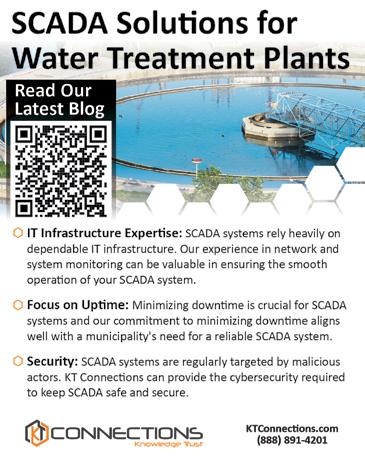
This elected officials segment serves as an introduction to municipal government for newly elected and appointed officials and a refresher for veteran officials. This segment is not intended to be all encompassing. Refer to the SDML’s Handbook for Municipal Officials for a more detailed outline of the statutes that pertain to municipal government.

The South Dakota Municipal League (SDML) was organized in 1934 as a nonpartisan, nonprofit association of incorporated municipalities in South Dakota.
The League’s mission is the cooperative improvement of municipal government in South Dakota. A vote of the members at the annual conference determines the League’s major policies. A 19-member governing body elected from among the members carries the responsibility of implementing these policies. A full-time executive director and staff administer the policies in their service to all members. By cooperating through the League, South Dakota municipalities provide themselves with a strong research program and an effective legislative voice.
The League’s primary source of financing comes through the membership dues paid by cities, towns, and affiliated organizations. The dues payments are based on population. Other League-sponsored activities and the sale of publications help generate additional revenue.
Perhaps the most widely used service is individualized problem-solving assistance. Municipal officials may contact the League office with any question or problem. A library of
extensive municipal information and experience covering years of city history is at every member’s disposal through the League hotline. From Americans with Disability Act to zoning, the League staff is ready and willing to help you with any problem.
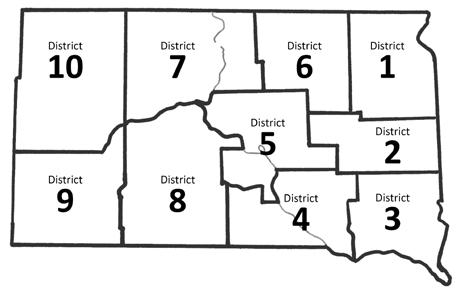
Each month, officials of member municipalities receive South Dakota Municipalities, the official magazine on issues that affect municipal operations daily. Member municipalities may place classified ads in the magazine and on the League’s website at no charge.
The Handbook for South Dakota Municipal Officials, developed with municipal officials in mind, represents the most complete and authoritative digest of South Dakota municipal laws available. The handbook remains current through staff-compiled annual updates.
Other publications available include:
• Guide to South Dakota’s Open Meetings Law
• Sample Personnel Policies
The legislative program is a predominant activity for the SDML. Throughout the year, the League staff works closely with legislators and committees toward the enactment of laws favorable to municipal governments. The League is the recognized legislative voice for the South Dakota municipalities.
As more programs shift from the federal level to the state and local level, a strong relationship with state officials has gained significance. The League acts as a liaison between municipal, county, and state governments to help meet this need. The League helps coordinate contacts between municipal and state officials.
Municipal officials meet regularly at
South Dakota Municipal League
208 Island Drive
Ft. Pierre, SD 57532
the SDML Annual Conference and at 10 district meetings. These forums provide training in city government, as well as an opportunity to exchange ideas and hear outstanding speakers on municipal affairs. Further, the League sponsors or co-sponsors several training schools, programs, and special meetings, including:
• Governmental Finance Officers’ School
• Governmental Human Resource School
• Elected Officials Workshop
• Election Workshops
• Annual Report Workshops
The League’s website, www. sdmunicipalleague.org, is a wealth of information at your fingertips. Find the latest news, event information, and much more. The library section has resources on everything from code enforcement and elections to special assessments.
As a member of the National League of Cities, SDML is able to cooperate with the NLC and 48 other state leagues on matters of national interest. This membership makes available to the South Dakota Municipal League the publications and library of NLC and brings valuable assistance and information on federal regulations and programs, as well as congressional representation.
The South Dakota Municipal League has established several programs to assist municipalities with cash management and investments, and with rising liability and insurance costs.
The SDML sponsors three risk sharing pools. The SDML Workers’ Compensation Fund was created in 1987. The South Dakota Public Assurance Alliance (SDPAA) has been providing liability and property coverage since 1987. The Health Pool of South Dakota (HPSD) was created July 1, 1995.
In 1991 the League endorsed the South Dakota Public Funds Investments Trust (FIT). This program assists local governments with their cash management and investment needs. Municipalities are using the FIT program as their tool for highly competitive rates, excellent service, flexible cash management options, sound investment advice, and a growing return on their funds. The FIT program representative can be reached at 800-658-3633. ■

Several organizations enjoy the benefits of being affiliate members of the South Dakota Municipal League. These organizations hold their meetings at the League’s annual conference and receive SDML staff support.
• SD Airport Management Association
• SD Municipal Attorneys’ Association
• SD Building Officials’ Association
• SD City Management Association
• SD Association of Code Enforcement
• SD Municipal Electric Association
• SD Governmental Finance Officers’ Association
• SD Governmental Human Resource Association
• SD Police Chiefs’ Association
• SD Municipal Street Maintenance Association
Municipalities have many powers listed in South Dakota law. For more details, refer to the SDML’s Handbook for Municipal Officials and to South Dakota Codified Laws.
It is extremely important to keep in mind that although a municipality has many powers, there are almost always conditions and restrictions on the use of those powers.
Municipal government is primarily governed by the provisions of Title 9 of South Dakota Codified Law, but several other chapters of law apply to municipalities. Title 9 and other codified laws are available online at http://sdlegislature.gov/Statutes/Codified_Laws/ default.aspx.
There are 309 incorporated municipalities in South Dakota. They are grouped according to two different factors: population and form of government.
There are three classes of municipalities:
• First Class: Those with populations of 5,000 or over. There are 18 first class municipalities.
• Second Class: Those with populations between 500 and 4,999. There are 98 second class municipalities.
• Third Class: Those with populations of 500 or less. There are 193 third class municipalities.

provides.

There are some cases where the size of the municipality determines what it may or may not do, but generally laws governing municipal government apply to all municipalities, regardless of size.
There are five forms of government in South Dakota, all five are briefly outlined here:
1. Trustee Form: Between three and five board members are elected at-large for three-year terms. The Trustees elect one of their own members to serve as the president of the board for a one-year term. There are 163 Trustee Municipalities in South Dakota.
2. Aldermanic Form: These municipalities are governed by a common council, which consists of a mayor who is elected atlarge and two aldermen from each ward. Terms of office are traditionally two years but may be set by ordinance for up to five years. There are 122 Aldermanic Municipalities in South Dakota.
3. Commissioner Form: The board of commissioners consists of a mayor and two or four commissioners who are all elected at-large. The terms of office are determined by ordinance but may not exceed five years. There are 11 Commissioner Municipalities in South Dakota.
4. City Manager Form: These municipalities are either aldermanic or commissioner form but employ a city manager. In the Aldermanic Form with a City Manager, the mayor and alderman are elected in the same manner as described above. In Commissioner Form municipalities that employ a city manager, the number of commissioners is nine, each elected for a three-year term. There are six municipalities that utilize the city manager form of government: Aberdeen, Brookings, Sturgis, Vermillion, Watertown, and Yankton
Land Surveying / Utility Analysis & Design / Landscape Architecture Street Design/ Agricultural Engineering / Water/

801 N. Phillips Ave., Ste 100 / Sioux Falls, South Dakota 201 Walnut Street / Yankton, South Dakota
LOCAL EXPERTS IN 605. 338. 6668 / 605.665.8092 / stockwellengineers.com

5. Home Rule: There are 11 municipalities which have adopted a home-rule charter: Aberdeen, Beresford, Brookings, Elk Point, Faith, Fort Pierre, Pierre, Sioux Falls, Springfield, Vermillion, and Watertown. A home rule charter must be adopted by a majority vote of the electors of the municipality. Article IX of the South Dakota Constitution states, “A chartered governmental unit may exercise any legislative power or perform any function not denied by its charter, the Constitution or the general laws of the state. The charter may provide for any form of executive, legislative and administrative structure that shall be of superior authority to statute, provided that the legislative body so established be chosen by popular election and that the administrative procedures be subject to judicial review. Powers and functions of home rule units shall be construed liberally.”

The common council shall consist of the mayor elected at large and two aldermen elected from and by the voters of each ward of the municipality, who shall hold office for two years, unless a municipality adopts an ordinance establishing the term of office to be three, four, or five years, and serves until their successors are elected and qualified (§9-8-4). A person may be nominated, elected, or appointed as a mayor or alderman if the person is a citizen of the United States, a voter of and resident of the municipality, and, if an alderman, a voter of and resident of the ward for which the person is to hold office (§98-1.1).
In 2022, the legislature passed a law allowing municipalities of the 2nd or 3rd class to choose to elect aldermen to the common council at large, following a majority vote at an election using processes provided in SDCL 9-11-6.
When a vacancy exists in the office of mayor, it shall be filled by appointment by a majority vote of the aldermen or special election. Until the vacancy is filled or during the time of temporary disability of the mayor, the powers and duties of mayor shall be executed by the president of the city council (§9-8-2).
When a vacancy exists on a municipal governing body, the remaining members shall appoint a replacement to serve until the next annual municipal elect ion, or the vacancy may be filled by special election as provided in §9-13-14 .2. In the aldermanic form, the appointment must be a person from the same ward of the firstor second-class municipality. There are also special provisions available for temporarily filling a vacancy caused by a member of the governing body being called to active duty (§3-4-8) or in cases where a member is incapacitated by illness or accident (§3-4-9).
The chief executive officer in the aldermanic form is the mayor, who is elected for a term of not less than two but not more than five years as determined by ordinance (§9-8-l).
The mayor presides at all meetings but only votes in case of a tie. The mayor may not break a tie on an ordinance or proposal to expend or appropriate money (§9-8-3; 9-8-10). The mayor performs the duties of office as prescribed by both laws and ordinances and is responsible for enforcing all the laws and ordinances of the municipality. (§9-8-3) The mayor can make recommendations to the common council and has the power to veto any ordinance or resolution or one or more items of appropriation ordinances or resolutions. (§9-8-3) The veto, with written objections, must be filed with the finance officer within ten
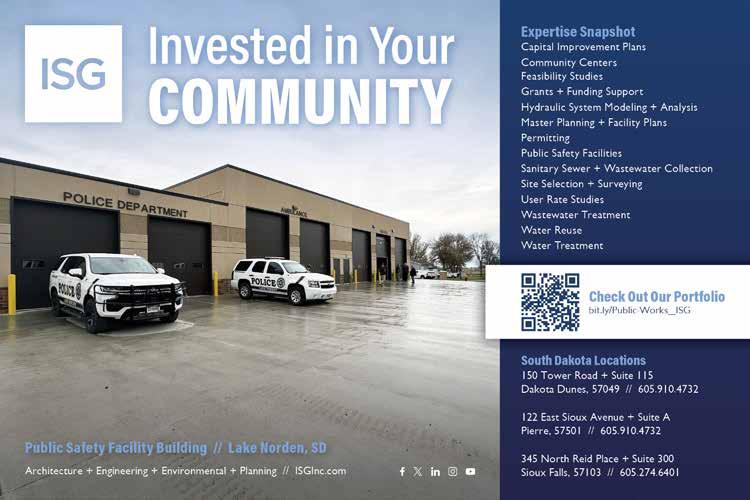
days after final passage (§9-19-10). If the mayor vetoes any ordinance, resolution, or other item, the finance officer shall present the vetoed item, along with the mayor’s written objection, to the council at their next meeting considered. If the ordinance or resolution passes by a two-thirds vote of the aldermen, it shall be published and become effective (§9-19-11).
At the first regular meeting after the annual election in each year and after the qualification of the newly elected alderman, the council shall elect from among its own members a president and vice-president, who shall hold their respective offices for the municipal year. In the absence of the mayor, the president of the common council is acting mayor and has all the powers of the mayor. In the absence or disability of the mayor and president, the vice-president shall perform the duties of the mayor and president (§9-8-7).
The council shall hold its regular meetings on the first Monday of each month. It may prescribe by ordinance the manner in which special meetings may be called and may change the day of its regular monthly meetings. A quorum is a majority of the aldermen. A quorum is necessary to do business. When a seat on the council is vacant due to removal, resignation, death, or by operation of law, the quorum consists of the majority remaining aldermen who are qualified to serve by election or appointment. It shall sit with open doors and shall keep a journal of its proceedings (§9-8-8). The yeas and nays shall be taken upon the passage of all ordinances and upon any proposal to create a liability against the municipality or for the expenditure or appropriation of its money, and in all other cases at the request of any member, which shall be entered on the minutes. The concurrence of a majority of the aldermen is necessary for the passage of an ordinance or proposal which expends or appropriates money. A two-thirds vote is required to sell any municipal property.
Composition and Qualification
Under the commission form, where a city manager is not employed, the board of commissioners shall consist of the mayor and two or four commissioners elected at large (§99-1). The commissioners must be citizens of the United States and residents and voters of the municipality (§9-9- 2).
The term of office of the members of the board shall be not less than two or more than five years as determined by ordinance (§9-9-3).
The resignation of the mayor or a commissioner shall be submitted in writing to the board. If the mayor or a commissioner moves their permanent residence outside the corporate limits of the municipality, the office is immediately vacated (§9-9-6).
Download free Elected Officials’ Orientation Packets customized for each form of government. Go to the Library section of www.sdmunicipalleague.org.
Each packet includes information on:
• Municipal Powers
• Ordinances and Resolutions
• Open Meetings Laws
• Open Records
• Rules of Order
• Finances and Budgeting
• Revenue Sources
• Bids and Contracts
• Liquor Licensing
The Elected Officials Workshop is held each July. Presentations from the most recent workshop can be found in the Library Section of the SDML website.

In case of a vacancy in the office of the mayor due to absence or disability, the board of commissioners shall appoint by a majority vote one of its members to act as mayor. The appointed commissioner’s official designation shall be “acting president of the board of commissioners” and is invested with all the powers and shall perform all duties of the mayor, during the mayor’s absence or sickness. The acting president has only one vote as a commissioner and is not entitled to vote as acting president (§9-9-8).
The mayor shall be president of the board and shall have a vote upon all questions but shall not have the right of veto (§9-9-7).
If any municipality is governed by a board consisting of five commissioners, the mayor is the chief executive officer of the municipality, presides at all meetings of the board, and has general supervision over all departments and officers. In the absence or inability of a commissioner the mayor shall temporarily take charge of the department of that commissioner. The mayor shall enforce all the laws of the municipality and require that the conditions of the grant of any franchise or privilege are faithfully complied with and performed. The mayor shall grant all licenses or permits, except as are required by ordinance to be granted by the board or by some other department or officer. The mayor shall supervise each public building of the municipality and each city park except in any municipality that has a park board, and the lighting of the streets, alleys, and public buildings of the municipality. The mayor shall annually and from time to time give the board information relative to the affairs of the municipality and shall recommend for the board’s consideration any measure the mayor deems expedient (§9-9- 20).
In a municipality governed by a board of five members, the commissioners shall designate by a majority vote one commissioner to be the “commissioner of public safety,” one commissioner to be the “commissioner of public works,” one commissioner to be the “commissioner of utilities,” and one commissioner to be the “commissioner of finance and revenue” (§9-9-18). OVERVIEW OF MUNICIPAL GOVERNMENT (CONT)
If there is a vacancy in the office of the mayor, the vacancy shall be filled by appointment pursuant to §9-9-8 until the position is filled by election at the next annual election (§9-9-6) or by special election as provided in §9-13-14.2.
The Public Safety Commissioner
If any municipality is governed by a board consisting of five commissioners, the commissioner of public safety shall have under their supervision the police and fire departments and the department’s officers and employees. The commissioner of public safety is also in charge of animal control within the municipality, including animal impoundments and shelter (§9-9-21).
The Public Works Commissioner
If a municipality is governed by a board consisting of five commissioners, the commissioner of public works shall supervise the streets, alleys, public grounds, and municipal improvements, and all public property, except as otherwise specially provided. The commissioner shall maintain the property in a clean and sanitary condition, and enforce all of all contracts, rules, and regulations necessary. (§9-9- 22).
The Finance and Revenue Commissioner
If a municipality is governed by a board consisting of five commissioners, the commissioner of finance and revenue shall enforce all laws for the assessment and collection of taxes of every kind and collection of all revenues belonging to the municipality from whatever source derived. The finance and revenue commissioner shall examine into and keep the board informed on the finances of the municipality and its assets and property (§9-9-24).
If a municipality is governed by a board consisting of five commissioners, the commissioner of utilities shall supervise the construction, maintenance, and operation of the waterworks, sewerage, and any other utility departments of the municipality. The commissioner of utilities shall enforce all regulations with respect to that department and its revenue (§9-9-23).
The board shall meet at least once each week or as otherwise determined by ordinance in regular meeting at a time and place as fixed by the board, to consider, take under advisement, and act on the business as may come before the board (§9-9- 11). Each meeting of the board is open to the public and the board shall keep a journal of its proceedings (§9-913). The yeas and nays shall be taken upon the passage of each ordinance and for any proposal to expend or appropriate money and in any other cases at the request of any commissioner, and each vote shall be entered on the journal of the board’s proceedings. A two thirds vote of the board is required to sell any municipal property. (§9-9-16).
A special meeting may be called by the mayor or by any two commissioners at any time, to only consider the matter mentioned in the call for the meeting. A notice of a special meeting shall be given pursuant to §1-25-1.1 and shall be provided to each commissioner (§9-9-12).

A majority of the board constitutes a quorum to do business. If a seat on the board is vacant due to removal, resignation, death, or by operation of law, the quorum consists of the majority of the remaining commissioners who are qualified to serve by election or appointment pursuant to chapter 9-13. The board may compel the attendance of any absentee under penalties as prescribed by ordinance. No action of the board is effective unless upon a vote of a majority of the board (§9-9-14).
No official may participate in discussing or vote on any issue in which they have a direct pecuniary interest (§6-1 17).
Under the aldermanic form, where a city manager is employed, the common council shall consist of the mayor elected at large and two aldermen elected from and by the voters of each ward of the municipality, who shall hold office for two years, unless a municipality adopts an ordinance establishing the term of office to be three, four, or five years, and serves until their successors are elected and qualified (§9-84). No person is eligible to be nominated, elected or appointed as a mayor or as an alderman unless such person is a citizen of the United States, a voter of and resident of the municipality, and if an alderman, a voter of and resident of the ward for which such person is to hold office (§9-8-1.1).
When a vacancy exists in the office of mayor, it shall be filled by appointment by a majority vote of the aldermen or by special election (§9-8-2). Until the vacancy is filled or during the time of temporary disability of the mayor, the powers and duties of mayor shall be executed by the president of the city council (§9-8-2).
When a vacancy exists on a municipal governing body, the remaining members shall appoint a replacement to serve until the next annual municipal election, or the vacancy may be filled by special election as provided in SDCL 9- 13-14.2. In the aldermanic form, the appointment must be a person from the same ward of the first- or second-class municipality. There are also
OF MUNICIPAL GOVERNMENT (CONT)
special provisions available for temporarily filling a vacancy caused by a member of the governing body being called to active duty (SDCL 3- 4-8) or in cases where a member is incapacitated by illness or accident (SDCL 3-4- 9).
The mayor shall be president of the board and shall have a vote upon all questions but shall not have the right of veto (SDCL 9-107). The Mayor is also the recognized head of the municipality for service of civil process and for military and ceremonial purposes; has emergency powers during times of public danger or emergency; and may have other duties prescribed by ordinance or resolution that are not inconsistent with the city management form of government (§9-10-7).
The City Manager is responsible for the administration of all affairs of the municipality which are placed in their care. They can appoint or remove all officers or employees in the administrative service of the municipality (SDCL 9-10-13).
Further responsibilities of the city manager are to:
• See to the enforcement of the law and ordinances
• Supervise the administration of the affairs of the municipality
• Make recommendations to the governing bodyAdvise the governing body of the financial status of the municipality
• Prepare an annual budget
• See that all terms and conditions in any contract or franchise are kept
• Be present at all meetings of the governing body, except when the governing body is considering their removal
• Sign all warrants after approval by the governing body, which warrants must then be counter signed by the finance officer
• Prepare and introduce ordinances and take part in discussion, but they do not have the power to vote
• Carry out any further powers and duties prescribed by ordinance or resolution (SDCL 9-10-15)
The governing body shall hold its regular meetings on the first Monday of each month at such hour as may be fixed by it. It may prescribe by ordinance the manner in which special meetings may be called and may also so change the date of its regular monthly meetings and so provide for regular meetings oftener than once a month (§9-10-8). All sessions of the board shall be open to the public. It shall keep a journal of its proceedings (§9-8-8). The yeas and nays shall be taken upon the passage of all ordinances and upon any proposals to create a liability against the municipality or for the expenditure or appropriation of its money, and in all other cases at the request of any member and shall be entered on the journal of its proceedings (§9- 8-10). The concurrence of a majority of the aldermen is necessary for the passage of an ordinance or proposal which expends or appropriates money. A two-thirds vote is required to sell any municipal property (§9-8-10).
No official may participate in discussing or vote on any issue in which they have a direct pecuniary interest (§6-1 7).
Under the commission form, where a city manager is employed, the board of commissioners shall consist of nine commissioners elected at large (§9-10-5 and 9-10-6). The commissioners must be citizens of the United States and residents and voters of the municipality (§9-9-2).
At the first regular meeting in May of each year, the commissioners elect one of their members to act as mayor for a term of one year (§9-10-6).
Before entering into the duties of their respective offices, the mayor and the commissioners must file an oath supporting the Constitution of the United States and of this state and to faithfully discharge the duties of their office. The oath also states that the official is not under direct or indirect obligation to appoint or elect any person to any office, position, or employment in the municipality (§9-9- 4). Finally, the mayor and the commissioners must also execute a bond, payable to the municipality, for the amount of two thousand dollars in second class cities, and for the amount of five thousand dollars in first class cities (§9-9-5).
The term of office of the commissioners shall be three years (§910-5).
The resignation of the mayor or a commissioner shall be submitted in writing to the board. If the mayor or a commissioner moves their permanent residence outside the corporate limits of the municipality, the office is immediately vacated (§9-9-6).
If there is a vacancy in the office of the mayor, the vacancy shall be filled by appointment pursuant to §9-9-8 until the position is filled by election at the next annual election (§9-9-6) or by special election as provided in §9-13-14.
In case of a vacancy in the office of the mayor due to absence or disability, the board of commissioners shall appoint by a majority vote one of its members to act as mayor. The appointed commissioner's official designation shall be “acting president of the board of commissioners” and is invested with all the powers and shall perform all duties of the mayor , during the mayor’s absence or sickness. The acting president has only one vote as a commissioner and is not entitled to vote as acting president (§99-8).
The mayor shall be president of the board and shall have a vote upon all questions but shall not have the right of veto (SDCL 9-107). The Mayor is also the recognized head of the municipality for service of civil process and for military and ceremonial purposes; has emergency powers during times of public danger or emergency; and may have other duties prescribed by ordinance or resolution that are not inconsistent with the city management form of government (§9-10-7).
The city manager is responsible for the administration of all affairs of the municipality which are placed in their care. They can appoint or remove all officers or employees in the administrative service of the municipality (SDCL 9-10-13).
Further responsibilities of the city manager are to:
• See to the enforcement of the law and ordinances
• Supervise the administration of the affairs of the municipality
• Make recommendations to the governing body
• Advise the governing body of the financial status of the municipality
• Prepare an annual budget
• See that all terms and conditions in any contract or franchise are kept
• Be present at all meetings of the governing body, except when the governing body is considering their removal
• Sign all warrants after approval by the governing body, which warrants must then be counter signed by the finance officer
• Prepare and introduce ordinances and take part in discussion, but they do not have the power to vote
• Carry out any further powers and duties prescribed by ordinance or resolution (SDCL 9- 10-15)
The board shall meet at least once each week or as otherwise determined by ordinance in regular meeting at a time and place as fixed by the board, to consider, take under advisement, and act on the business as may come before the board (§9-9- 11). Each meeting of the board is open to the public and the board shall keep a journal of its proceedings (§9-9-13). The yeas and nays shall be taken upon the passage of each ordinance and for any proposal to expend or appropriate money and in any other cases at the request of any commissioner, and each vote shall be entered on the journal of the board’s proceedings. A two thirds vote of the board is required to sell any municipal property (§9-9-16).
A special meeting may be called by the mayor or by any two commissioners at any time, to only consider the matter mentioned in the call for the meeting. A notice of a special meeting shall be given pursuant to §1-25-1.1 and shall be provided to each commissioner (§9-9-12).
A majority of the board constitutes a quorum to do business. If a

seat on the board is vacant due to removal, resignation, death, or by operation of law, the quorum consists of the majority of the remaining commissioners who are qualified to serve by election or appointment pursuant to chapter 9-13. The board may compel the attendance of any absentee under penalties as prescribed by ordinance. No action of the board is effective unless upon a vote of a majority of the board (§9-9-14.)
No official may participate in discussing or vote on any issue in which they have a direct pecuniary interest (§6-1 17).
Composition and Qualification
The board of trustees of a third-class municipality shall consist of not less than three nor more than five members elected at large. Each shall be a legally qualified voter of the municipality. The number of trustees of a municipality may be increased to five or reduced to three in the manner prescribed by chapter 9-11 (§9-7-1).
The members of the board of trustees shall qualify for office within ten days after the first meeting of the month next succeeding the election by filing an oath or affirmation of office (§9-13-28).
The members of the board of trustees shall hold office for three years and until their successors are elected and qualified. However, at the first election after incorporation, one trustee is elected for one year, one trustee is elected for two years, and one trustee is elected for three years. At subsequent elections each trustee is elected for a term of three years (§9-7-3).
When a vacancy exists on a municipal governing body, the remaining members shall appoint a replacement to serve until the next annual municipal election, or the vacancy may be filled by special election as provided in §9-13-14.2. There are also special provisions available for temporarily filling a vacancy caused by a member of the governing body being called to active duty (§3-4-8) or in cases where a member is incapacitated by illness or accident (§3-4-9).
At the first regular meeting after their election, the trustees must elect one of their members to serve as president of the board of trustees. This term of office is for one year (§9-7-5).
The board shall hold regular meetings at such times as may be provided by ordinance. Special meetings of the board may be held at any time upon call of the president or clerk by oral or written notice to the members present within the municipality (§9-7-6). A majority of the members of the board shall constitute a quorum, but no act of the board shall be effective unless assented to by a majority of the members (§9-7-7).
No official may participate in discussing or vote on any issue in which they have a direct pecuniary interest (§6-1- 17). ■
Municipalities may enact, make, amend, revise, or repeal all such ordinances, resolutions, and regulations as may be proper and necessary to carry into effect the powers granted thereto (§9-19-3).
The word “ordinance” means a permanent legislative act within the limits of its powers of the governing body of a municipality (§9-19-1).
A resolution, on the other hand, means any determination, decision, or direction of the governing body of a municipality of a temporary or special character for the purpose of initiating, effecting, or carrying out its administrative duties and functions (§9-19-1). In the case of State ex rel. Wagner v. Summers, 33 S.D. 40, 54, 144 N.W. 730, 734 (1913) the Court ruled that the terms “resolution” and “motion” are practically synonymous.
Ordinances must be in the following style:
“An ordinance (insert title)”
“Be it ordained by the (city or town) of (insert the name of the municipality)” The substance of the ordinance follows (§9-19-6).
The governing body of each municipality must publish the full accounts of its meetings. The publication is to appear in the official newspaper of the municipality, or if there is no official newspaper, any legal newspaper which serves the municipality. The proceedings must be published within twelve business days after each meeting (§9-18-1). The publication must include a detailed statement of all expenditures of money, showing the names of all persons who received remuneration as well as the service provided (§9-18-1). It is further required that the finance officer deliver a copy of the proceedings to be published in the official newspaper within five business days from the date the meeting was held (§9-18-1.1).
If a meeting is required to be open to the public, and if any printed material
Ordinances can only have one subject, which must be expressed in its title (§9-19-5). The formalities of style, reading, publication, and the effective date of ordinances are not applicable to resolutions (City of Brookings v. Martinson, 1933, 61 SD 168, 246 NW 916).
Municipalities are authorized to provide for the punishment of each violation of an ordinance, resolution, or regulation with a fine not exceeding five hundred dollars or by imprisonment not exceeding thirty days or by both such fine and imprisonment (§9-19-3).
All ordinances shall be read twice by title with at least five days between each reading. If passed, the ordinances shall be signed by the mayor or acting mayor or president of the board of trustees and filed with the finance officer. With few exceptions, ordinances, after being signed and filed, must be published at least once in the official newspaper (§919-7). The vote on the second reading of all ordinances must be recorded and published (§9-19-9).
Resolutions differ from ordinances in that any resolution may be passed after only one reading. The resolution must be published at length either separately or in the minutes of the meeting. The votes for and against the resolution must also be published (§9-19-8).
Unless an ordinance or resolution is drawn to take effect immediately upon passage, all ordinances and resolutions become effective on the twentieth day after passage and publication, unless suspended by operation of a referendum (§9-19-13).
Voters have the right to propose their own ordinances through the initiative process, or to refer any legislative decision of the governing body through the referendum process. ■

More information on these processes can be found in the Handbook for Municipal Officials or in §9- 20.
relating to an agenda item of the meeting is distributed before the meeting to all members of the governing body, the material shall either be posted on the governing body’s website or made available at city hall at least twentyfour hours prior to the meeting or at the time the material is distributed to the governing body, whichever is later. If the material is not posted to the governing body’s website, at least one copy of the printed material shall be available in the meeting room for inspection by any person while the governing body is considering the printed material. These requirements do not apply to materials exempt from disclosure or to printed material or records related to an agenda item of an executive or closed meeting (§1-27-1.16).
The law requires every municipal officer to keep a record of the official acts and proceedings of their office. These records must be open for public inspection during business hours under reasonable restrictions (§9-18-2).
Documentary material or data which consists of trade secrets, or commercial or financial information made or received by a municipality or an economic development corporation receiving municipal funds for the purpose of furnishing assistance to a business is not a public record (§9-34-19).
Patient information identifying the patient’s name, address, diagnosis, or treatment received by an ambulance is not a public record and is confidential (§34-11-5.1). ■
It’s just a meeting...right? Nothing to worry about...right? I just need to show up and vote...right?
Council meetings - although seemingly simple - can become complicated. Such meetings involve many procedures, statutory direction, and ethical obligations.
The open meeting law (SDCL Chapter 1-25) is intended to encourage public participation in government. The provisions of this idea are contained in three different statutes. Meetings are subject to the direction of these three statutes are those meetings of boards and commissions which are created by law OR which are entitled to receive revenue directly from public tax funds. Therefore, all your city meetings must comply with the open meeting requirements. Any time a legal quorum of your entity is discussing public business, meaning any matter relating to the activities of the entity, you must notify the public in the appropriate manner in the appropriate timeframe. This applies whether the discussion is in person, by telephone or any other electronic means.
SDCL 1-25-11 further states that recording of open public meetings is permitted. No state, political subdivision, or public body may prevent a person from recording, through audio or video technology, a public meeting that is open to the public as long as the recording is reasonable, obvious, and not disruptive.
The open meetings law requires that all public bodies prominently post a notice and copy of the proposed agenda, that is visible, readable, and accessible, at the organization’s principal office at least 24 hours PRIOR to the meeting. The notice shall also be posted on the public body’s website as soon as possible if one exists. Special provisions exist for special or rescheduled meetings. The notice must be delivered in person, by mail, by email, or by telephone, to all local news media that have asked to be notified (SDCL 1-25-1.1).
There are specific circumstances where a meeting can be closed to the public and the media (Executive Session). Such circumstances include (SDCL 1-25-2):
• The elected officials may discuss the qualifications, competence, performance, character or fitness of any officer or employee including prospective officers or employees. Contractors are not included in the term officer or employee.
• The elected officials may consult with their attorney or receive communication from their attorney about proposed or pending lawsuits or contract problems.
• The elected officials may prepare for labor negotiations with the municipality’s employees.
• The elected officials may discuss marketing or pricing strategies of a business owned by the municipality (electric, liquor, telephone, etc.) if public discussion may be harmful to the competitive position of the business. This includes utility boards.
• The elected officials may discuss information listed in subdivisions 1-27-1.5(8) and 1-27-1.5(17).
Also see the Conducting the Public’s Business in Public brochure in SDML's online library.

In addition, when a municipality or an economic development corporation receiving municipal funds is considering furnishing assistance to a business and has made or received material or data consisting of trade secrets or commercial or financial information regarding the operation of that business, such discussion or consideration may be done in executive session closed to the public (SDCL 9-34-19).
Please keep in mind, however, no official action (votes) may be taken in such a private meeting ... and you must disclose the purpose of the executive session. Such purpose must be included in the minutes of the meeting (SDCL1 25-2).
In order to go into an executive, or closed, meeting a majority vote of the governing body is required. The matters discussed during the executive meeting are restricted to the purposes specified in the motion to go into executive session.
An open meetings commission has been established by the Attorney General’s Office to investigate and determine whether a violation occurred. Additional information regarding this set of laws can be found on the SDML website. The Attorney General’s website (http://atg.sd.gov) also has further information regarding the laws.
All municipalities are encouraged to establish some model under which to operate... whether this is Robert’s Rules of Order or some other procedure. Although state law provides certain parameters regarding how business items are handled, the city has some discretion over their parliamentary procedure. These procedures might govern everything from rules for public participation to how motions are made.
To conduct business, the city council takes one of three actions: motions, resolutions or ordinances. Ordinances are a permanent legislative act within the limits of municipal power. A resolution on the other hand means any determination, decision, or direction of the governing body of a municipality of a temporary or special character for the purpose of initiating, effecting, or carrying out its administrative duties and functions. Resolutions and motions are practically synonymous.
To conduct any business a quorum must first be present. A quorum is a majority of the elected body. Then, a majority of the elected body must affirmatively vote on a particular action for passage. Reading and publishing requirements follow the introduction of an ordinance or resolution. Unless an ordinance or resolution is drawn to take effect immediately upon passage, all ordinances and resolutions become effective on the 20th day after passage and public action. ■
This is only a summary; consult the League’s Handbook for Municipal Officials for more details.
Statute indicates resources a municipality is permitted to receive. Further, statutes expressly and/or implicitly state the purposes for which those resources may be used. All resources received and spent shall be according to the law. For this reason, municipalities have evolved a means of indicating legal compliance by use of “fund accounting.” (Municipal Accounting Manual, produced by SD Department of Legislative Audit)
Cities must hire a finance officer that looks after Municipal Funding, keeps books and oversees various other aspects of city business. Despite, however, the hiring of a brilliant, intuitive finance officer elected officials are urged to become generally familiar with Municipal Funding. All government, regardless of its level, is based upon the old checks and balances idea. If you don’t get involved and learn about all aspects of your city’s business, you cannot be an active participant in that balancing system.
The term “Fund” is defined as “a fiscal and accounting entity with a selfbalancing set of accounts recording cash and other financial resources, together with all related liability and residual equities or balances, and changes therein, which are segregated for the purpose of carrying on specific activities or attaining certain objectives in accordance with special regulations, restrictions or limitations.” (Defined by The Governmental Accounting Standards Board.)
Municipalities are charged with a diverse set of obligations, and therefore the checks and balances system is essential and necessary when determining legal compliance. The required accounts are organized on the basis of funds, each of which is completely independent of any other. Each fund must be so accounted for that the identity of its resources, obligations, revenues, expenditures, and fund equities is continually maintained.
Funds are classified according to the source of revenue and the type of activities they finance. Funds of a similar nature are classified according to fund groups.
This is only a summary; consult the League’s Handbook for Municipal Officials for more detail.
The municipal fiscal year begins January first. South Dakota statutes require, as preparation for the budget, an estimate of expenditures and revenues for the ensuing year to be reported on or before the first day of September. The finance officer should report this estimate to the governing body. Cities that employ a city manager are, however, exempt from this rule and must submit an annual report to the governing body not later than August first of each year. In preparing this budget the finance officer may include a line item for contingencies (not to exceed five percent of the total budget). Expenses cannot be charged to this item, but by resolution budget authority can be transferred out where needed. In order to aid the finance officer in preparing the annual BUDGET the various boards and commissions are required to submit an annual report estimating the expenses to be incurred for the ensuing year.
No later than the first regular meeting of the governing body in September or within 10 days thereafter, the annual appropriations ordinance for the ensuing year must be introduced. As an alternative, a municipality may move the deadline for introducing the annual appropriation or budget to as late as the first regular meeting of the governing board in November. Each municipality that opts to move the deadline s shall, by ordinance, establish budget hearing and publication deadlines pursuant to § 9-19-7. (SDCL 9-21-34). The purpose of the appropriations ordinance is to appropriate such sums of money as may be deemed necessary to meet the lawful expenses and liabilities of the municipality. In specifying the functions and sub-functions made in the appropriations ordinance, the
governing body is required to follow, as far as it is applicable, the classification of expenditures for each department and office of the municipality as prepared by the state department of legislative audit.
Neither the governing body nor any department can expend any sum in excess of the amount appropriated for any purpose within the department except as provided by SDCL 9-21-9.2, which provides that any authorized expenditures to be used for the benefit of another political subdivision shall be restored to the fund from which it was withdrawn. There are also exceptions for newly available funds due to the receipt of grant money. See SDCL 9-21-9 and 9.1.
Appropriation ordinances must be approved by a majority of all aldermen (the mayor cannot vote to break a tie), trustees or members of the board of commissioners. Some veto power does, however, exist. See SDCL 9-8-3 and 919-10 for more detail. Upon passage, the appropriations ordinance must be published in the same manner as all other ordinances. Please note that supplemental appropriation ordinances and emergency appropriation ordinances are appropriate under specific circumstances and may be passed in the event sufficient revenues are not available for an indispensable function of government.
The FINANCE OFFICER shall keep a separate account of each fund or appropriation and the debits and credits. Going back to the definition of a FUND ACCOUNT ... monies spent from such fund shall only be spent for the purposes for which the fund was established! There are procedures established to transfer funds, this requires a 2/3 vote of the governing body. AND the money transferred cannot be expended for any purpose not authorized by the annual appropriations ordinance.
Before any money can be spent an itemized in voice must be presented along with a voucher verified by the
appropriate municipal official. The invoice and voucher shall be filed in the Finance Office. In addition, such expenditures shall be fully itemized and entered in governing body meeting minutes.
No money can be paid out of the treasury except upon the warrant of the mayor or president of the board of trustees and countersigned by the finance officer. In cities employing a city manager, the warrant must be signed by the manager and countersign ed by the finance officer before any sum can be paid.
As of July 1, 2012, cities are allowed to establish an incidental account from which advanced payment or claims requiring immediate payment may be made. The amount available in the fund is to be established by the governing body, with detailed account of expenditures to be presented not less than monthly. All expenditures from this account shall be listed with other bills in the regular proceedings of the governing body. All claims made on the incidental account require the signatures of two officers of the municipality (SDCL 9-23-23).
SDCL 9-22-21 requires the annual financial report to be submitted to the governing body at the first regular meeting of May and published within thirty days thereafter or upon completion of the annual audit. By the last day of May each year, the financial officer shall file a copy of the report with the Department of Legislative Audit.
The municipal annual report for smaller municipalities is designed to be a simplified financial report. SDCL 4-11-4 authorizes the auditor general to accept an annual report in lieu of a formal audit of the records of a municipality which receives less than six hundred thousand dollars in annual revenues and receives less than five hundred thousand dollars of federal financial assistance in any one year. As a result, small municipalities should file the annual report forms with the Department of Legislative
audit immediately after the report to the governing body.
Personal property inventories of all municipal departments shall be filed with the finance officer not later than January 10 of each year.
A complete list of salaries of all officers and employees should be published with the minutes of the first meeting in January or within thirty days thereafter. Added salaries of new employees and increased salaries of existing employees should be shown in the month in which they occur.
The due date for special assessment installments, which are payable under either Plan One or Plan Two option, is January first.
Urban renewal agencies are required to file an annual report on or before March 31 with the governing body and the Auditor General.
The finance officer shall at the first regular meeting in May present the annual report to the governing board and publish it within thirty days or upon completion of the annual audit. By the last day of May each year, the financial officer shall file a copy of the report with the Department of Legislative Audit.
Special assessment installments become delinquent on May first.
Not later than the first regular meeting of September or within ten days thereafter, the annual appropriation ordinance is introduced.
Between the fifteenth day of September and the first day of October, the auditor or finance officer must certify all Plan Two delinquent special assessments to the county auditor.
The tax levy must be certified to the county auditor on or before October 1.
The special assessment roll or all assessments payable under Plan One must be delivered to the county auditor no later than November 1.
Fiscal year ends December 31.
The Department of Legislative Audit provides an approval function for municipal audits in that engagements are approved up-front, and a draft of the final report is approved at the end of each audit. Audits of municipalities are performed by Independent Public Accountants or by the Department of Legislative Audit at least once every two years. Any city who receives an independent audit shall make the audit report available on their website.
Please note that in lieu of an audit, an “internal control review” is required to be performed at least once every five years in municipalities with revenues ranging from six hundred thousand dollars to one hundred thousand dollars.
Further, upon the request of the governing body or for special reasons the auditor general may audit the books and records of any office or any officer of the municipality, or upon request by a petition signed by twenty percent of resident taxpayers of a taxing district.
The Municipal Accounting Manual, produced by SD Department of Legislative Audit, can be found at http://legislativeaudit.sd. gov/ under the Resources tab. ■

As a newly elected public official, the public arena may seem foreign. Not only are you charged with knowledge of your local ordinances and policies, but you must also feel comfortable with state statutes and policies.. To assist both newly elected officials and those previously elected to office, the League publishes the Handbook for Municipal Officials. The handbook introduces newly elected officials to their new jobs and also serves as a reference manual throughout an official’s tenure in office. The handbook references state statutory law and Attorney General Opinions offering further commentary on state law.
To help newly elected officials get started and to help returning officials review their accepted duties, we have created the following timeline outlining important actions to take within the first 90 days of office.
• Check with the finance officer about being covered by a bonda bond is required of certain elective and appointive municipal offers (SDCL 3-1-5). (Bond amount is determined by particular office and city size.)
• Learn about the South Dakota Open Meetings law and become familiar with bid laws and surplus property laws. Cities must follow specific procedures to acquire, dispose of or exchange property. You can find both of these topics under the Library tab on the League’s website, www.sdmunicipalleague.o rg.
• Become familiar with how your public office will affect your ability to become personally involved with areas of city concern.
• Request a detailed map of your city.
• Request and review a copy of the current city budget.
• Request a copy of the city code of ordinances and then review the table of contents so that you are somewhat familiar with what the code contains.
• Review city council meeting minutes from the previous three to six months.
• Meet your city employees.
• Review the most recent list of goals and objectives, if any, adopted by the city council.
• Talk with your fellow policy leaders and key staff members about the processes and methods used to effectively work together.
• Get to know the League ... we are here as a resource.
• Review the current city budget and the most recent city audit, or annual financial report.
• Review a list of city employees that shows the name, job title, salary, and tenure of each person on the payroll. Compare this information with the salaries from surrounding communities of similar size. Are salaries reasonable?
• Read your city’s capital improvements plan or community builder plan or long-term projects list if they exist.
• Review the job descriptions on file for city employees.
• Review the city’s policy manuals and employment contracts. Do you have a personnel policy? Are you aware of any current human resource issues within the city? The SDML has Sample Personnel Policies available for purchase; contact the League at 800-658-3633.
• Request a copy of the city’s zoning and district map for your reference.
• Review your city’s civil defense plan and/or disaster preparedness and emergency response plan if one exists. If you do not have one, consider whether it is necessary.
• Read your city’s most recent water and wastewater inspection reports.
• Review your city’s urban renewal plans or urban renewal district plans, if any exist.
• Review your city’s comprehensive plan, if one exists.
• Review your city’s investment policy. As a great investment alternative, the League endorses the South Dakota Public Funds Investment Trust (FIT). Contact PMA Financial at the League (800-658-3633) regarding FIT or for a sample investment policy.
• Review your workers’ compensation and insurance policies...we can help with this too! Contact the League office at 800-658-3633. ■


City officials are required to abide by specific laws regarding behavior and business decisions to prevent situations involving a conflict of interest. There are several types of “conflict:” holding concurrent offices with conflicting interests, involvement in a government contract and personal or pecuniary interest in a vote. If identified and handled correctly a “conflict” is not an issue.
Each official shall decide if any conflict of interest requires such official to be disqualified from participating in a discussion or voting. So, if a conflict exists, how can an individual be impartial enough to make this judgment call? When you begin to have a personal vested interest in a particular issue, it may be time to voluntarily excuse yourself from the issue. It is part of your responsibility as an elected official to recognize when this exists and remedy it.
The law goes on to occasionally FORCE you to remove yourself. NO SUCH official may participate in discussing or vote on an issue if the following circumstances apply (SDCL 6-1-17):
• The official has a direct pecuniary interest in the matter before the governing body or (this applies to any financial interest in the decision...such as family member employees, a new street in front of your business, etc.)
• At least 2/3 of the governing body votes that an official has an identifiable conflict of interest that should prohibit such official from voting on a specific matter.
• Next is the contract issue: It is unlawful for any public officer or their agent to be interested in any contract entered into by the municipality. There are, however, some exceptions to this rule (SDCL 6-1-2):
• Any contract involving five thousand dollars or less regardless of whether other sources of supply or services are available within the county, municipality, township, or school district, provided that the consideration therefore is reasonable and just.
• Any contract involving more than five thousand dollars but less than the amount for which competitive bidding is required, and there is no other source of supply or services available within the county, municipality, township, or school district provided that the consideration therefore is reasonable and just and further provided that the accumulated total of such contracts paid during any given fiscal year shall not exceed the amount specified in SDCL 5-l SA-14.
• Any contract with any firm, association, corporation, or cooperative association for which competitive bidding is not required and where other sources of supply and services are available within the county, municipality, township, or school district, and the consideration therefore is reasonable and just, unless the majority of tl1e governing body are members or stockholders who collectively have controlling interest, or any one of them is an officer or manager of any such firm, association, corporation, or cooperative association then any such contract shall be null and void;
• Any contract for which competitive bidding procedures are followed pursuant to SDCL 5-18A or 5-18B, and where more than one such competitive bid is submitted.
• Any contract for professional services with any individual, firm, association, corporation or cooperative, if the individual or any member of the firm, association, corporation, or cooperative is an elected or appointed officer of a county, municipality, township, or school district, whether or not other sources of such services are available within the county, municipality, township or school district, provided the consideration therefore is reasonable and just.
• Any contract for commodities, materials, supplies, or equipment found in the state price list established pursuant to SDCL 5-lSD-6 and 5- lSA-28, at the price there established or below.
• Any contract or agreement between a governmental entity specified in SDCL 6-1-1 and a public post-secondary education al institution when an employee of the Board of Regents serves as an elected or appointed officer for the governmental entity, provided that the employee does not receive direct compensation or payment as a result of the contract or agreement.
• Any contract with any firm, association, corporation, individual, or cooperative association for which competitive bidding procedures are followed pursuant to chapter 5-l SA, and where only one such competitive bid is submitted, provided the procedures established in SDCL 6-1-2.1 are followed.
All of the conditions in each subsection must be met fully in order for the contract to be valid (SDCL 6-1-2).
Another statutory exemption to the provisions of SDCL 6- 1-1 appears in SDCL 6-1-3. This statute allows a bank to be the official depository of funds notwithstanding that an officer, director, stockholder, or employee of a bank is an elected or appointed officer or treasurer of such county, municipality, township, or school district. (SDCL 6-1-3)
If competitive bidding procedures have been followed pursuant to chapter 5-18A, and the bid notice has been placed on the central bid exchange pursuant to SDCL 5-18A-13 for two weeks prior to the opening of bids, a bid from an officer of the governing body may be opened and accepted provided the consideration is reasonable and just as determined by the governing body or a disinterested governmental entity. (SDCL 6-1-2.1)
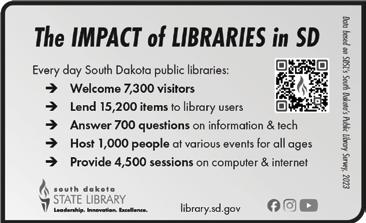
Finally, an elected official cannot hold concurrent offices if such positions are incompatible. The major lines of delineation in this area have been made by the Attorney General. For example, the Attorney General has determined that there are essentially four instances when offices are incompatible. They are: 1) when there are statutory prohibitions; 2) when one is subordinate to the other; 3) when one has supervision over the other; and 4) when the duties of the two offices are conflicting. (AGR 1949-50 , p.37)
However, the Attorney General has also determined that, while the determination of whether a person may hold two or more positions is usually based upon incompatibility or inconsistency, the question of incompatibility or inconsistency never arises when there is a special statutory prohibition. The rule that governs will change from situation to situation (AGR 1959-6 0, p.45).
Positions which are compatible include the following:
• Mayor and state’s attorney (AGR 1907-08, p. 215)
• Office of mayor and member of the board of county commissioners (AGR 1949-50, p. 37)
• Mayor and state senator (AGR 1949-50, p. 358)
• Treasurer of a school district and trustee of an incorporated municipality (AGR 1949-50, p. 75)
• Assessor and register of deeds (AGR 1949-50, p.56)
• Office of county commissioner and membership on the governing board of a municipality (AGR 1929-30, p. 278)
• Office of state’s attorney and city attorney (AGR 1949-50, p. 331)
• Municipality marshal and sheriff or deputy sheriff (AGR 1953-54, p. 84)
• Police magistrate and candidate for the state legislature (AGR 1953- 54, p. 292)
• Office of county clerk of courts and city councilman (AGR 1955-56 p. 68-9)
• Office of register of deeds and mayor (AGR 1955-56, p. 217)
• Office of county sheriff and peace officer of a municipality within the county (AGR 1955-56, p.420)
• Appointed municipality treasurer and treasurer of a school district (AGR 1959-60, p. 45)
• No mayor, alderman, commissioner, or trustee in a municipality is disqualified from holding office as a result of holding any liquor license (SDCL 9- 14-16)
• City council and county commission (AG Opinion 88-24)
• Any mayor, alderman, commissioner, or trustee may serve in a volunteer, unsalaried municipal position or provide any service for the municipality if the compensation for such service does not exceed $5,000 per calendar year (SDCL 9-14-16.1)
Positions which are incompatible include the following:
• No mayor, alderman, commissioner, or trustee shall hold any other office under the municipality while an incumbent of any such office. No auditor or clerk may hold the office of treasurer in the municipality while an incumbent of such office. (SDCL 9-14-16)
• A mayor may not be an attorney for a defendant in a criminal case for a crime committed within the municipality of which
they are mayor. (State ex rel. Jones v. Taylor, 46 SD 354)
• A city councilman may not be the defense attorney or counselor for a defendant charged with the violation of a municipal ordinance or a state law where the facts would also be a violation of the laws of their municipality. (AGR 1953-54, pp. 184- 186)
• Member of municipality board and janitor of a municipal building (AGR 1932-34, p. 492)
• County judge and city attorney (AGR 1949-50, p. 133)
• Member of a city council and municipal building, electrical, and plumbing inspector (AGR I 955- 56, pp. 105-106)
• Member of city council and county high school board (AGR 1949-50 page 75 and 1953-54, p.73)
• Office of director of assessments and member of municipal governing board (AGR 1955-56, p. 304)
• County justice of the peace and the municipal chief of police (AGR 1957-58, p. 116)
• Municipality auditor and county auditor (AGR 1959- 60, p. 84)
• Legislator and school board member (AG Opinion No. 84-24)
• Mayor and school board member of encompassing school district (AG Opinion No. 85-23; Raymond v. Richardson, 6th Judicial Circuit, Sept. 18, 1985)
• County director of equalization and school board member. (AG Opinion 86-6)
Despite the guidance provided by the Attorney General and case law, conflict remains a confusing subject. If (and when) you experience a conflict issue consult with your city attorney or contact the League at 800-658-3633. ■

Swimming pools should be tested for coliform bacteria during each week of operation. All pool samples should be tested for total coliform, which is an indicator bacteria for drinking water and pools.
Total Coliform Negative means that no coliform bacteria were found and the water is safe.
Total Coliform Positive means that coliform bacteria were found.
Two or more consecutive positive samples indicates a general trend of bacteria presence in the pool. Corrective measures should be taken, such as superchlorination, to prevent a health-related incident caused by poor water quality.
Municipal swimming pools are not regulated by the State of South Dakota. iStock.com/Jane_Kelly







The Cat ® 950 GC wheel loader is designed specifically to handle all the jobs on your worksite from material handling and truck loading to general construction and stockpiling. Great machine performance combined with the low owning and operating costs makes the 950 GC the right choice for your business.

MOUNT RUSHMORE EVENING LIGHTING CEREMONY, Keystone
BLACK HILLS FARMERS MARKET, Rapid City
ENDS AUG 21
PALACE CITY FARMERS MARKET, Mitchell
ENDS AUG 15
SPLASH PATIO CONCERT SERIES, Rapid City
ENDS AUG 15
OPEN AIR MARKET, Canton
FALLS PARK FARMER'S MARKET, Sioux Falls
MARKET AT THE MERIDIAN, Yankton
BLACK HILLS FARMERS MARKET, Rapid City
1 2
MOUNT RUSHMORE RODEO AT PALMER GULCH, Hill City
DOWNTOWN AT SUNDOWN, Brookings
1ST FRIDAYS ON MAIN, Mitchell
LEVITT AT THE FALLS: CROW, Sioux Falls
PALACE CITY PRE-STURGIS PARTY, Mitchell
LEVITT AT THE FALLS: BABES IN CANYON, Sioux Falls
EASTBANK BLOCK PARTY, Sioux Falls
AUG 2-3
RODEO, Watertown
AUG 2-4
POTATO DAYS, Clark
AUG 2-4
SIOUX RIVER FOLK FESTIVAL, Canton
AUG 2-10
SIOUX EMPIRE FAIR, Sioux Falls
AUG 2-11
LEVITT AT THE FALLS: NADJAH NICOLE, Sioux Falls
LEVITT AT THE FALLS: PHIL BAKER, Sioux Falls
AUG 3-4
HORSE NATION INDIAN RELAY RACES TOUR OF CHAMPIONS: RUN WITH THE WARRIORS, Pine Ridge
DOWNTOWN IN MADTOWN, Madison
WILD WEST WEDNESDAYS RODEO, Rapid City
DOWNTOWN AT SUNDOWN, Brookings
LEVITT AT THE FALLS: SKERRYVORE, Sioux Falls
AUG 8-10
CLAY COUNTY FAIR, Vermillion
AUG 8-11
PLEIN AIR PAINT OUT, De Smet
AUG 8-11
CASTLEWOOD DAYS, Castlewood
AUG 8-11
KUL WICASA WACIPI, FAIR & RODEO, Fort Thompson
LEVITT NATIONAL TOUR PRESENTS: THE WAR AND TREATY, Sioux Falls
AUG 9-11
SUNFLOWER FESTIVAL, Highmore
LEVITT AT THE FALLS: BEE TAYLOR, Sioux Falls
PIONEER AUTO SHOW 70TH ANNIVERSARY CELEBRATION, Murdo
AUG 10-11
HORSE NATION INDIAN RELAY RACES TOUR OF CHAMPIONS: LOWER BRULE RACES, Fort Thompson
AUG 10-11
THRESHING SHOW, Twin Brooks
ENDS AUG 11

MOTORCYCLE RALLY, Sturgis 5 10 12 6 7 8 9
AUG 12-15
TURNER COUNTY FAIR, Parker
AUG 12-18
BROWN COUNTY FAIR, Aberdeen
RED CLOUD INDIAN ART SHOW, Pine Ridge 11 13 14 15 16 17
DOWNTOWN IN MADTOWN, Madison
WILD WEST WEDNESDAYS RODEO, Rapid City
DOWNTOWN AT SUNDOWN, Brookings
LEVITT AT THE FALLS: HALFLOVES, Sioux Falls
LEVITT AT THE FALLS: HUMBIRD, Sioux Falls
AUG 16-18
SUMMER ARTS FESTIVAL, Yankton
AUG 16-18
RIVERBOAT DAYS, Yankton
AUG 16-18
BLACK HILLS THRESHING BEE, Sturgis
AUG 16-25
CENTRAL STATES FAIR & RODEO, Rapid City
MOUNT RUSHMORE RODEO AT PALMER GULCH, Hill City
THUNDERHAWK WIDE OPEN, Lemmon
DOWNTOWN RIVERFEST, Sioux Falls
LEVITT AT THE FALLS: THE REMINDERS, Sioux Falls
BLACK HILLS SUPER 6, Spearfish
AUG 17-18
THRESHING BEE, Rosholt
AUG 17-18
CIVIL WAR DAYS, Canton
LEADING LADIES & DAKOTA SPIRIT, Spearfish
DOWNTOWN IN MADTOWN, Madison
AUG 20-22
DAKOTAFEST, Mitchell
AUG 20-25
KOOL DEADWOOD NITES, Deadwood
AUG 21-25
CORN PALACE FESTIVAL, Mitchell
AUG 21-25
WACIPI, FAIR & RODEO, Rosebud
DOWNTOWN AT SUNDOWN, Brookings
LEVITT AT THE FALLS: THE REBEL EVES, Sioux Falls
AUG 22-25
PRAIRIE VILLAGE STEAM THRESHING JAMBOREE, Madison
LEVITT AT THE FALLS: LANCE AND LEA, Sioux Falls
AUG 23-24
WINE, BREW & BBQ, Hill City
AUG 23-25
FALL RIVER HOT AIR BALLOON FESTIVAL, Hot Springs
MOUNT RUSHMORE RODEO AT PALMER GULCH, Hill City
LEVITT AT THE FALLS: MAMES BABEGENUSH, Sioux Falls
SIZZLIN' SUMMER NIGHTS, Aberdeen

AUG 24-25
FRONTIER DAYS RODEO, Interior
MARATHON & HALF
MARATHON, Sioux Falls
AUG 27-SEPT 1
MUSTANG RALLY, Sturgis
DOWNTOWN AT SUNDOWN, Brookings
LEVITT AT THE FALLS: 2MX2, Sioux Falls
AUG 29-SEPT 2
SOUTH DAKOTA STATE FAIR, Huron
LEVITT AT THE FALLS: NIKKI HILL, Sioux Falls
LEVITT AT THE FALLS: THE SENSATIONAL BARNES BROTHERS, Sioux Falls



LYNN BREN | SDPAA EXECUTIVE DIRECTOR
Consider these scenarios…. A water main break has flooded a major emergency response route in your town…. A commission meeting is taken by flash mob and confronted with life threatening attacks…Your main government building has caught fire which is raging uncontrollably…. How prepared are you to respond to the staff that is impacted? To the media? To your citizens? Regardless of what the emergency is, local governments are the first place that the community, and the media, come for instruction and guidance. This is why it is important for government entities to consider what their Emergency Response Plan is, and to ensure that it is not only still applicable, but adaptable. In this article we are going to talk about Emergency Response plans, what they are, why they are necessary, and to hopefully prompt your community to take the time to make sure that your plan is ready for anything.
An emergency response is quite simply the first response to any unexpected event. Note here that it doesn’t have to be a large-scale event, but the emergency response plan will typically focus on a large scale, unforeseen event which impacts the health and or safety of the general public in your area. The primary focus of your emergency response plan is to identify resources required to respond to an emergency and how to mobilize the same in the most efficient manner possible. Your emergency response plan may start with a response to a smaller scale event, and then become adaptable for a larger scale emergency. For example, your response to the fire at your government building may look specifically different than a flood which interrupts service and access to homes, but at their heart, each of these responses relies on the same key set of components.
An Emergency Response Plan should include a communication plan. Your plan should identify who is responsible for communicating what information and to whom. Your communication plan should always include your media policy. The intent of the media policy is to ensure that proper information is being presented to the public. This is not intended to restrict the flow of information, but rather to ensure that correct information is provided in a logical manner which does not interfere with the resolution of the emergency or event. Misinformation is often times one of the biggest interruptions for resolution after an emergency situation has occurred. Using your media policy to communicate information to the public will help maintain confidence in the actions that your entity is taking. Your communication plan should also include the best methods for communicating vital information such as evacuations. Consider in your plan the best method for communicating this information, and also consider alternatives in the event the best choice is not an option. Evacuation plans should be put together and reviewed periodically to ensure that your plan is viable and adaptable. Communication of the evacuation plan should be considered ahead of an emergency.
Your plan should also include resource identifi cation and mobilization. Your plan should consider what resources would be needed. After you’ve acknowledged what resources you need, be sure to identify where to get them, who’s responsible for obtaining what, and where do they go after you get them? Do you have a plan set up for a secondary response location if your primary place of business is the subject of the need for this emergency response plan? Have you updated your point of contact with the vendors who


are going to supply you with these critical resources? Do you have a backup plan in case your first choice for supply chain response is impacted by your emergency? Which of your community resources do you need to call upon – Fire, Police, Ambulance? Being adaptable in your plan is going to be critical to its success. Having considered alternatives ahead of the emergency is going to save you time when faced with an obstacle that forces you to pivot from your original plan. When considering your resources, keep in mind these may range from consumables such as food and water, but can also span out to services such as medical and other technical skills. Be sure that your plan includes consideration for coordination with neighboring communities. When considering your emergency plan, be mindful that you may also be considered another’s resource. Does your plan consider the contingencies for when your community is not the only one impacted by the emergency? How far, both time and spatially, have you planned out for resource acquisition?
We’ve covered the very high-level basics of what an Emergency Response Plan should contain, and we’ve touched briefly on the fact that this plan needs to be reviewed for sustainability. But I don’t know that we have emphasized just how important it is to not only create your plan but review it, communicate it and TRAIN ON IT! Remember back in grade school when each quarter we had to do the fire and tornado drills? Remember stop, drop, and roll? Of course, you do because it was trained into us! For those who grew up in the Midwest, or at least rural South Dakota, your first instinct in a public building is going to be to run to the bathroom in the event of a tornado. After you review your Plan, you must conduct training, especially for those immediately
involved in the emergency response plan. The major plans such as these should be almost like muscle memory, so that when emotions are high, and the questions are loud, folks in charge know what they are supposed to do, who they are supposed to call, where they are supposed to be. They won’t have to sort through the chaos of trying to figure out who is going to call who, because they’ve already done it several times, they know who to call, or from whom to expect a call. They will know where to go to find the information on what level of emergency response you are dealing with, and what resources are going to be triggered for this response. Through the training and collaboration with your fellow agencies and resource partners, you’ll be better prepared to respond to the needs of the public who depend on you.
When considering your Emergency Response Plan, don’t be afraid to get innovative when finding ways to satisfy communication and resource needs, but also don’t forget to look for information on the diverse benefits that may be available for those in need. Your Emergency Response Plan should include resources needed after the emergency has passed. Keeping nearby a network of resources which may be available to your local government body itself, or the citizens who live in your community will help to get back to pre-emergency status. Making sure that the information that you have available is current and accurate will reinforce the confidence that your community leadership is taking them in the right direction… not just on the daily, but during those times when solid leadership matters most.
Finally, please do understand that Emergency Response Plans are important and complicated enough to dedicate a several article series to. We could cover several pages and get down into the nitty gritty of your plan. I urge you to call upon all the resources you have at your disposal. Those Members of the SDPAA have a large portfolio of sample policies and procedures available. All of you have access to the various governmental agencies as well as each other! We look forward to seeing you all at the upcoming Conventions for Conservation Districts, Counties, Cities and Towns & Townships. We especially look forward to seeing your community at the upcoming Safety Conference in November, and hearing all your names during the various Safety Awards lunches that are coming up over the next few months!
BE SAFE! ■

PIERRE, S.D. – The South Dakota Department of Agriculture and Natural Resources (DANR) recently announced the Board of Water and Natural Resources has approved $105,010,958 in additional American Rescue Plan Act (ARPA) grants for drinking water and wastewater system improvements in South Dakota. These funds are to be administered by the Department of Agriculture and Natural Resources.
The American Rescue Plan Act provides grants for eligible water, wastewater, stormwater, and nonpoint source projects. Through Governor Noem’s leadership and overwhelming support of the legislature, the state of South Dakota is making a historic investment
in infrastructure by dedicating $689,384,221 of ARPA funding for local water and wastewater infrastructure grants. This allocation represents the last of the ARPA water funding.
“I am pleased to announce this financial assistance is available,” said DANR Secretary Hunter Roberts. “Safe and reliable water and infrastructure helps protect our environment and strengthen communities for our kids and grandkids.”
Grants were awarded from State’s ARPA funds to the following:
Aurora-Brule Rural Water received an additional $846,775 ARPA grant to
install a new parallel water main, a new water storage reservoir, multiple loops within the system, a booster station, and make distribution line improvements. Previous funding for this project was awarded in April 2022
BDM Rural Water System received an additional $1,738,345 ARPA grant to construct a new water treatment plant, install a water reservoir, install pipe to expand the water system and loop lines for added redundancy, and replace water meters. Previous funding was awarded in April 2022.
Black Hawk Water User District received an additional $254,340 ARPA grant to install a new water


main crossing I-90 near Exit 52. The existing crossing is undersized and not operating effectively. Previous funding was awarded in June 2022.
Brookings received an additional $8,000,000 ARPA grant to construct a new lime softening water treatment facility along 34th Avenue. The new treatment plant will require the installation of raw and finished water lines to feed into the distribution system and includes the construction of six new municipal wells and a new transmission main. Previous funding was awarded in April 2022.
Brookings-Deuel Rural Water System received an additional $1,357,708 ARPA grant to construct water main to interconnect the system's two primary water sources, the Joint Well Field, and the Clear Lake Water Treatment Plant. The project will also include installation of a new water main to the Lake Cochrane service area to improve low pressures around the lake during periods of peak water use. Previous funding was awarded in April 2022.
Clay Rural Water System received an additional $2,488,710 ARPA grant to construct two ground storage reservoirs near the existing Greenfield reservoir and the Wakonda Water Treatment plant. A new booster station at the Greenfield reservoir and distribution line improvements to provide additional capacity and accommodate a Highway 46 construction project is also included. Previous funding was awarded in April 2022.
Davison Rural Water System received an additional $189,255 ARPA grant to install a water line to parallel and loop existing mains and make upgrades to its automatic meter reading technology. Previous funding was awarded in April 2022.
Fall River Water User District received an additional $1,400,007.62 ARPA grant to install a submersible pump and finish piping at the existing Fairburn well, construct a pump station and well house, a control building/pump station, a ground storage reservoir at the well site, pipeline to connect the Fairburn
well to the existing distribution system in two locations, and a ground storage reservoir along the new pipeline route. Previous funding was awarded in June 2022.
Grant-Roberts Rural Water System received an additional $1,023,690 ARPA grant to add transmission capacity allowing the system's two reservoirs to fill during high water use periods. Additional pipeline looping and parallels will be completed to distribute water to existing and new customers and improve the reliability of the water system. The project also includes installation of new pipeline and other appurtenances to allow the town of Corona to access the GrantRoberts Rural Water System. Previous funding was awarded in April 2022.
Hanson Rural Water System received an additional $548,388 ARPA grant to install water lines to parallel and loop of existing mains and make upgrades to its automatic meter reading technology. Previous funding was awarded April 2022.
Joint Well Field, Inc. received an additional $1,440,459 ARPA grant to construct a new gravity filtration water treatment plant including aeration, detention, filtration, transfer pumping, raw water supply wells, and generation equipment. Previous funding was awarded in April 2022.
Kingbrook Rural Water System received an additional $4,972,298 ARPA to upgrade the Badger pump station, DeSmet water treatment plant, Chester water treatment plan, Oakwood pump station, and the Orland pump station. The project also involves construction of an elevated tank near Arlington and booster pump station near Bryant, and relocation and resizing of pipeline segments along Highway 25 north of DeSmet. Previous funding was awarded in April 2022.
Lead-Deadwood Sanitary District received an additional $339,623 ARPA grant to abandon the Hanna raw water transmission pipeline and install new ductile iron or steel pipe. Both low- and high-pressure lines will be re-routed
to bypass the Englewood power generation facility, and a portable backup power generator will be purchased for use at multiple locations. Previous funding was awarded in June 2022.
Lead-Deadwood Sanitary District also received an additional $136,662 ARPA grant to make improvements to the wastewater treatment plant serving Lead, Deadwood, Central City, and other unincorporated areas. Improvements include replacement of five aeration blowers, installation of fine bubble diffusers and aeration piping, and installation of a blower control system. Previous funding was awarded In June 2022.
Lewis & Clark Regional Water System received an additional $5,000,000 ARPA grant to construct two solids contact units, a sludge thickener, three lime sludge drying beds, and a three million gallon clear well and high service pump station to increase the treatment plant capacity. Previous funding was awarded in April 2022.
Lincoln County Rural Water System received an additional $571,211 ARPA grant to install transmission improvements to serve newly constructed residences. The project will install approximately 16.5 miles of pipeline and includes looping of dead-end lines. Previous funding was awarded in April 2022.
Mid-Dakota Rural Water System received an additional $6,830,882 ARPA grant to update the existing water system by installing an advanced metering infrastructure system, paralleling of pipe, addition of a new backwash recovery system, and additional membrane capacity. Previous funding was awarded in April 2022.
Mni Wašté Water Company received an additional $6,545,503 ARPA grant to install a treated water pipeline, a water tower, and appurtenances including valves, pumps, and air releases. This project replaces the undersized pipeline along Highway 63 and will serve as the main pipeline for the northern tier of the Cheyenne River Sioux Tribe. Previous
funding was awarded in April 2022.
Randall Community Water District received an additional $10,000,000 ARPA grant to address increasing demand among existing customers and supply water to the City of Mitchell. The proposed improvements will provide enough capacity to allow Mitchell to connect its redundant water line to the system. Booster stations, storage facilities, and an upgrade to the Platte Water Treatment Plant are necessary to complete the proposed improvements. Previous funding was awarded in June 2022.
Rapid City received an additional $8,000,000 to make improvements to its wastewater treatment facility by adding secondary clarifiers and hydraulic improvements which allows the South Plant to assume all inflow while meeting permit limits. This project would also decommission the North Plant. Previous funding was awarded in April 2022.
Shared Resources received an additional $10,000,000 ARPA grant for a treatment plant, well field, distribution pipeline, and two storage tanks. Shared Resources is a joint effort between Minnehaha Community Water Corporation and the Big Sioux Community Water System. Previous funding was awarded in April 2022.
Sioux Falls received an additional $8,000,000 ARPA grant to make substantial improvements throughout the city’s wastewater reclamation facility and to expand the plant capacity to accommodate growth in the region. Previous funding was awarded in May 2022.
Sioux Rural Water System received an additional $765,583 ARPA to construct a new elevated tank in the southwest part of the system and two segments of pipeline to increase pressure and capacity. Previous funding was awarded in April 2022.
South Lincoln Rural Water System received an additional $2,444,355 ARPA grant to make system wide improvements including installing an elevated water tank, a new pump station, and a new water treatment plant. This project addresses capacity issues in portions of the distribution system and increasing demands within the existing service area. Previous funding was awarded in April 2022.
Southern Black Hills Water System received an additional $542,432 ARPA grant to extend the existing water system main from the two wells at Paramount Point Subdivision approximately 5 miles northeast to the Spring Creek Acres Subdivision to provide redundancy. The project will also construct a new well, booster pump station, new elevated storage reservoir, chlorination and SCADA systems, and new pressure reducing valve stations. Previous funding was awarded in April 2022.
TM Rural Water District received an additional $1,272,908 ARPA grant to install four miles of parallel 12-inch water main to address low water pressure situations during high
water demand periods. Previous funding was awarded in April 2022.
Tripp County Water User District received an additional $2,034,121 ARPA grant to replace two storage tanks, to parallel and loop water lines to increase the water pressure within the system, and to develop a new well field to address water supply issues. Previous funding was awarded in April 2022.
WEB Water Development Association received an additional $10,500,000 ARPA grant. The funding is part of a much larger project to increase water capacity for WEB and to provide a bulk water connection for Aberdeen and BDM Rural Water. The project is known as the Water Investment in Northern South Dakota or WINS project, undertaken by all three entities with WEB acting as the lead contracting entity at this time. Previous funding was awarded in June 2023.
Western Dakota Regional Water System received an additional $2,165,000 ARPA grant for a feasibility study to explore the use of its Missouri River water to supply a large portion of western South Dakota with a bulk water transmission line conveying Missouri River water to various communities, tribes, and water systems. The current funding will be used to hire an engineering firm to complete the facilities plan and preliminary design for the project. Previous funding was awarded in April 2022.
West River/Lyman-Jones Rural Water System received an additional $602,702 ARPA grant to install PVC water mains serving areas in Mellette, Haakon, and Lyman counties. A new ground storage tank and necessary electrical controls would also be installed in Pennington County. Previous funding was awarded in April 2022.
Information about ARPA funding packages awarded in April and June 2022 can be found at news.sd.gov.
The board approved the funding at their June 27 meeting in Pierre. ■







The individuals behind IM-28 say it repeals the tax on food. But the truth is, it repeals the tax on ANYTHING sold for human consumption, including tobacco products. As a result, passing IM-28 will create a gigantic hole in our state budget. Though the measure claims to have good intentions, it’s actually very bad for South Dakotans. Passing IM-28 will set us up for a state income tax — which the vast majority of South Dakotans DO NOT WANT.
1. IM-28 eliminates sales taxes on MANY items other than food, cutting at least $176 million in annual funds to the state.
IM-28 prohibits South Dakota from collecting taxes on anything sold for human consumption, except alcohol and prepared food. Other items include tobacco, vaping products, CBD, mouthwash, toothpaste, aspirin, marijuana, beverages, toilet paper and much more.
And with 80% of our state expenditures going to education and health & human services, cutting $176 million from our budget means South Dakota’s children, patients and seniors would be most negatively affected by the passage of IM-28.
2. IM-28 will kill cities and towns, preventing them from collecting sales taxes on the same items.
Our communities are prohibited from taxing anything the state can’t tax. This will cut a major source of revenue for South Dakota cities and towns, above the $176 million loss to the state, resulting in additional local budget cuts affecting law enforcement, roads, pools and parks.
3. IM-28 is a trap — deliberately setting us up for a state income tax.
IM-28, by the way it is drafted, is deliberately MUCH broader than groceries and is designed to force South Dakota to implement a state income tax to replace the lost revenue.
4. IM-28 will reduce funding for Tribal governments via sales tax compacts with the state.
Tribes in South Dakota have compact agreements with the state to distribute a portion of sales tax collections to them; this would substantially diminish that funding source.
5. IM-28 is poorly written and creates major problems.
South Dakota has a low, broad-based sales tax (currently 4.2%) that has worked well for decades. Passing this sloppy, ill-conceived measure would be a huge mistake. We need to VOTE NO on IM-28.
JOIN US IN OPPOSING IM-28
• South Dakotans Against a State Income Tax
• Coalition for Responsible Taxation
• Greater Sioux Falls Chamber of Commerce
• SD Association of Cooperatives
• SD Bankers Association
• SD Cattlemen’s Association
• SD Chamber of Commerce & Industry
• SD Economic Development Professionals Association
• SD Education Association
• SD Farm Bureau
• SD Hotel & Lodging Association
• SD Licensed Beverage Dealers & Gaming Association
• SD Municipal League
• SD Music & Vending Association
• SD Petroleum & Propane Marketers
• SD Retailers Association
PIERRE, S.D. – The South Dakota Department of Health (DOH) recently announced that nearly 200 cities, counties, and tribes across South Dakota will collectively receive $500,000 in grants to combat mosquitoes and prevent the spread of West Nile Virus (WNV) in 2024. These grants have been allocated to support local efforts in controlling mosquito populations and reducing the risk of WNV transmission.
Grant recipients were selected based on various factors, including the population of the applying jurisdiction and its history of human WNV cases up until 2023. Every community that applied for funding was awarded a grant, ranging from $500 to $20,000, reflecting the specific needs and challenges faced by each locality. These reimbursement grants are designed to alleviate some of the financial burdens associated with mosquito control measures necessary for protecting public health.
DOH Secretary Melissa Magstadt emphasized the importance of community efforts in mosquito control and the prevention of WNV.
"The dedication and proactive measures taken by our communities are vital in our fight against West Nile Virus. These grants will provide essential support to local mosquito control programs, ensuring the health and safety of our residents."
In early July, the department issued a release announcing a mosquito control advisory following recent flooding, highlighting the increased need for effective mosquito control measures.
"Our continued commitment to supporting local mosquito control programs is crucial, especially in light of recent flooding events that have increased the risk of mosquito breeding," added Secretary Magstadt.
The detection of the first WNV mosquito pool in Brookings County was announced in late June.
For more information about the 2024 WNV Awards, please visit the DOH website. The complete list of 2024 award recipients can be found at https://doh.sd.gov/media/z3bgfrvo/2024west-nile-awards.pdf.
At the heart of the Department of Health’s mission is a simple goal: to protect and improve the health of all South Dakotans. The department is entrusted with the vital task of promoting wellness, preventing disease, and ensuring access to quality healthcare for all South Dakotans. ■
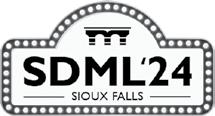

Let us know! Email us a 250-word description of your city’s notable achievement – a project, initiative, award, or individual honor. Include an image if possible. emilie@sdmunicipalleague.org
Excellence in Municipal Government Award
Due: Aug. 15
Recognizes a municipal employee (even years) or an elected official (odd years) a who has made significant contributions to their municipality and community. Presented in October at the SDML annual conference during the Excellence in South Dakota Municipal Government Award Luncheon. Learn more/apply: www.sdmunicipalleague.org
SDML Hall of Fame
Due: Sept. 15
Honors elected and appointed officials and employees who have served municipalities in South Dakota for 20 or more years. Inductees will be recognized at the fall SDML annual conference and listed in the November issue of the South Dakota Municipalities magazine.
Learn more/apply: www.sdmunicipalleague.org/ About-HallofFame
Deadwood Fund Grant, SD State Historical Society
Due: Oct. 1 annually
Awarded in amounts ranging from $1,000 to $25,000 to encourage large-scale restoration or rehabilitation of historic properties.
Learn more/apply: https://history.sd.gov/preservation/ fundingopportunities.aspx

South Dakota Park and Recreation Association (SDPRA) Annual Conference
Sept. 9-12, Sioux Falls
Registration: $200 - SDPRA member; other options available
Gathers parks and recreation professionals from throughout the region to explore the endless potential the profession provides communities 365 days a year.
Learn more/register: www.sdpra.com
Fuel the Growth Economic Development Course, Economic Development Professionals Association
Oct. 7-10, Rapid City
A Basic Economic Development Course that covers 10 economic development topics, including business development, organizational development, and community development Participants will learn from experts and colleagues through presentations, panel discussions, case studies, and networking opportunities. Sponsored by the Economic Development Professionals Association and hosted by Black Hills State University.
Learn more/register: www.BHSU.edu/FueltheGrowth
SDML Annual Conference
Oct. 8-11, Sioux Falls
Registration: $125 members; $225 Non-members; other registration options available
Gathers municipal employees and elected officials from across the state to network, learn new tips and trends, share best practices, and discover new products from exhibitors.
Learn more/register: www.sdmunicipalleague.org/ about-annualconference
City Summit, National League of Cities
Nov. 13-16, Tampa Bay, FL
The largest educational and networking event for city officials in the United States, it brings together thousands of city leaders, corporate partners, and city staff for four days of educational seminars, policymaking, and networking activities. Held annually by the National League of Cities.
Learn more/register: https://citysummit.nlc.org



















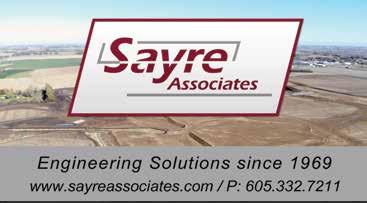
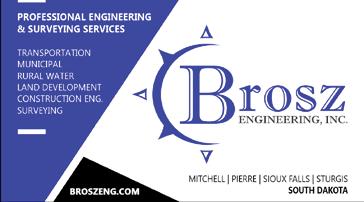












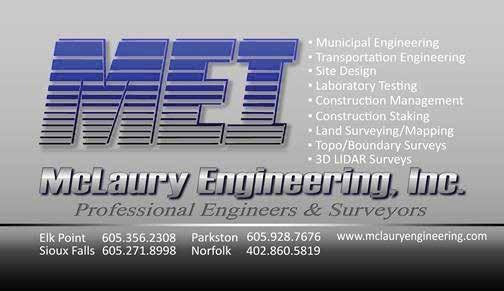



































Agriculture is the lifeblood of South Dakota. Our state’s farmers and ranchers rise before dawn and put in the hard work necessary to feed America. As a member of the Senate Agriculture Committee, I have the opportunity to advocate for South Dakota producers, and the farm bills that Congress takes up every few years are among my top priorities as a senator.



I’ve had a hand in crafting four farm bills during my time in Congress, and my number one goal is always to ensure each bill reflects the needs and priorities of the men and women on the ground: farmers and ranchers, their families, and everyone else who helps strengthen our state’s agriculture community. As I travel around the state, I always take special note of my conversations with agriculture producers, and many of the bills I introduce for inclusion in the farm bill are based on these conversations.
The current farm bill will expire later this year, which is why Congress needs to focus on advancing the next farm bill. Not only are deadlines approaching, but updates are needed to a number of farm programs, and this work is all the more critical given the headwinds farmers and ranchers are currently facing.
Sen. John Boozman (R-Ark.), the lead Republican on the Senate Agriculture Committee, recently released a farm bill framework to get this process moving. It builds off of House Republicans’ farm bill, which advanced out of the House Agriculture Committee with bipartisan support. Unfortunately, progress in the Senate has been hamstrung by my
Democrat colleagues’ insistence on prioritizing things like climate over the needs of farmers and ranchers. I hope that this new framework and the action in the House will refocus efforts on farmers and ranchers – instead of Democrats’ climate obsession – and move deliberations along.
In preparation for this next farm bill, I introduced a number of pieces of legislation that I hope to get included in the final bill. As I mentioned, they are based on the conversations I’ve had with farmers and ranchers as I travel throughout South Dakota, as well as events I’ve held to hear from producers about their priorities for the farm bill.
Importantly, this framework would make improvements to the Agriculture Risk Coverage and Price Loss Coverage programs, which are essential elements of the farm safety net. I’m pleased that the Senate framework also contains measures from a number of the bills I introduced. It includes elements of my Conservation Reserve Program (CRP) Improvement Act, which would make CRP a more effective option for producers. It also includes my CRP Flexibility Act, which would provide additional drought flexibilities for CRP contract holders. And it includes legislation I introduced to make crop insurance more affordable for young farmers, plus elements of another bill I introduced to increase processing options for livestock producers and expand smaller meatpackers’ capacity are incorporated into the framework.
This framework is an important step forward in producing a farm bill that delivers for farmers and ranchers. Again, I hope that my Democrat colleagues will approach pursuing a bipartisan farm bill with a new seriousness about helping farmers and ranchers, not advancing their climate agenda. There needs to be more farm in the farm bill, and farmers and ranchers can’t afford any more unnecessary delays. ■





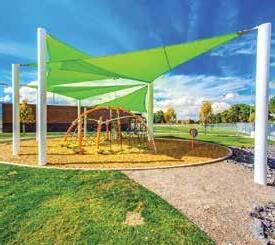

SDML WORKERS’ COMPENSATION FUND
NOTICE OF BOARD OF TRUSTEES ELECTION
WEDNESDAY, OCTOBER 9, 2024
RAMKOTA HOTEL AND EVENT CENTER, SIOUX FALLS, SD
The SDML Workers' Compensation Fund Board of Trustees election will be held Wednesday, October 9, 2024, at the annual membership meeting during the SDML Annual Conference in Sioux Falls, SD.
Two city seats are up for election. The positions are currently held by:
• Jodi Mathis, HR Director, Spearfish
• Brittany Smith, City Administrator, Philip
If you are interested in a position on the SDML Workers' Compensation Fund or would like to nominate someone who is a Member of the SDML Workers’ Compensation Fund and is either an elected or appointed official, please send a letter of application by the deadline date of September 6, 2024, to:
Lisa Nold
SDML Director of Risk Sharing Services
208 Island Drive
Ft. Pierre, South Dakota 57532
Phone: 1-800-658-3633
E-mail: Lisa@sdmunicipalleague.org
Positions on the Board of Trustees are for three years, and the successful candidates will be seated on January 1, 2025. All nominations for the election will be forwarded to the Nominating Committee. ■
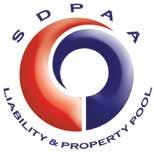
The South Dakota Public Assurance Alliance (SDPAA) Board of Directors election will be held Wednesday, October 9, 2024, at the SDPAA Annual Membership meeting during the SDML Annual Conference in Sioux Falls, SD. The election shall be determined by a majority of those SDPAA Member entities present and voting with each Member entity having one vote. Election winners will be seated on the Board of Directors starting January 1, 2025 to serve a three-year term. A copy of the Board of Directors Election Policy Resolution is available upon request.
If you are interested in a position on the SDPAA Board of Directors, you must meet the following qualifications:
Article V – Paragraph 2 - Qualifications of Members of the Board.
Members of the Board shall be either:
a. Elected officials of an Alliance Member, provided the governing Board of the Member in question has supported their appointment or candidacy by Resolution; or
b. Representatives, employees, or appointed officials of an Alliance Member, provided the governing Board of the Member in question has supported their appointment or candidacy by Resolution.
SDPAA Board of Directors positions up for election are currently held by:
• Mike Wiese, Brown County Commissioner, Aberdeen
• Paullyn Carey, City Finance Officer, Huron
• Bill O’Toole, Director of Human Resources, Sioux Falls
Please send a letter of application and supporting Resolution by the deadline date of September 6, 2024, to:
Lisa Nold, Director of Risk Sharing Services
South Dakota Municipal League
208 Island Drive
Ft. Pierre, South Dakota 57532
Phone: 1-800-658-3633
Email: Lisa@sdmunicipalleague.org
All applications will be forwarded to the SDPAA Nominating Committee. ■





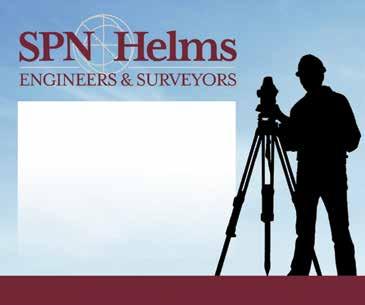
Water and Wastewater Distribution, Collection, and Treatment
Streets, Airports, and Drainage
Land Surveying and GIS
Master Planning and Land Development Recreation Trails, Swimming Pools, and Sports Complexes
PIERRE, S.D. – Applications for the next round of the Deadwood Fund grant program through the South Dakota State Historical Society are now available. Applications should be postmarked no later than Oct. 1 for work beginning no sooner than Jan. 1, 2025.
The grant program is designed to encourage large-scale restoration or rehabilitation of historic properties by individuals, organizations, or public agencies.
Grants will be awarded in amounts ranging from $1,000 to $25,000. The grant amount must be matched on a dollarfor-dollar basis from nonfederal and non-state sources. Nonprofit organizations will be allowed to use in-kind services for one-half of their match.
Funding for the program is from Deadwood gaming revenue earmarked by state law for historic preservation projects throughout the state and distributed by the State Historical Society.
Applications are due Oct. 1 and Feb. 1 each year. Grant forms are available online at https://history.sd.gov/ preservation/fundingopportunities.aspx. ■
PIERRE S.D. – The South Dakota Department of Agriculture and Natural Resources (DANR) has confirmed an infestation of emerald ash borer (EAB) in Brookings, South Dakota.
DANR has expanded the existing state Plant Pest Quarantine to include Brookings County. The updated quarantine area now includes all of Brookings, Minnehaha, Lincoln, Turner, and Union Counties. EAB has been identified in the communities of Baltic, Brandon, Brookings, Canton, Crooks, Dakota Dunes, Lennox, Sioux Falls, and Worthing. The quarantine is designed to slow the spread of EAB.
The quarantine, which is in place year-round, prohibits the movement of firewood and ash materials out of Brookings, Lincoln, Minnehaha, Turner, and Union counties. Movement of firewood from any hardwood species, whether intended for commercial or private use, is also restricted. If an ash tree is infested before it is cut, the wood may still contain EAB larvae. An individual split piece of ash firewood can have five or more adults emerge yet this summer.
“We all need to work together to slow the spread of EAB,” said DANR Secretary Hunter Roberts. “Firewood is the most common way EAB is moved from one location to another. Please, follow the quarantine restrictions and buy it where you burn it!”
Treatments made early in the season can kill the young larvae before they are able to injure the tree. Property owners within a 15-mile radius of Brookings wanting to save their ash trees should contact a commercial applicator as soon as possible.
EAB is a boring beetle that feeds on all species of North American ash. It was first detected in the United States in 2002, and in South Dakota in 2018.
For more information about EAB or to report a suspected sighting visit emeraldashborerinsouthdakota.sd.gov. ■
Airport ARFF/Operations/Maintenance Technician – City of Pierre, SD. Responsible for providing general daily oversight of airside operations by monitoring overall airfield safety, performs vehicle and equipment maintenance, airfield lighting maintenance and performs aircraft rescue firefighter duties. Maintains lighting systems, vehicles, equipment, grounds, structures, pavement and turf. Assists in overseeing wildlife management at airport through annual training, assisting in depredation permits, and overseeing bird strike report program. Maintains documentation and records of all actions taken on airfield to ensure compliance with FAA Part 139 certification requirements. Wage offer will be based upon actual education and experience. Comprehensive benefit package. UP TO A $3,000 HIRING BONUS! Learn more and apply at www.cityofpierre.org. Open until filled. EOE.
City Administrator - City of North Sioux City (NSC), SD. NSC is an aldermanic form of government. The City Administrator reports to the Mayor and City Council. Application materials requested include: cover letter, resume, salary history, five work-related references, and official job application. Detailed job description and application can be found online at northsiouxcity-sd.gov under Departments/Human Resources. Position remains open until filled. Applications and requested information can be mailed to City of North Sioux City, 504 River Drive, North Sioux City, SD 57049 or emailed to amy.lilly@northsiouxcity-sd.gov. Open until filled.
Communications Officer – City of Pierre, SD. Work as part of a team operating the Central South Dakota Communications Center, the 911-Emergency Dispatch Center for central South Dakota. Receiving calls for assistance from the public; document and dispatch appropriate public safety personnel for those calls. Receive, process, and send radio communications for various Law Enforcement Agencies, Emergency Medical Services, and local Fire Departments. 40 hours per week - Shift work. Comprehensive benefit package. UP TO $3000 HIRING BONUS! Learn more and apply at www.cityofpierre.org. Open until filled. EOE.
Communications Specialist (E-911) - City of Mitchell, SD. Responsible for answering emergency and non-emergency calls and for dispatching appropriate personnel. Provides guidance to callers until emergency personnel arrive on scene; receives and transmits radio and telephone communication; monitors security cameras; and greets and assists visitors at the customer service window. No experience in the field is necessary; however, sufficient experience to understand basic principles relevant to the major duties of the position. Possession of or ability to readily obtain NCIC and EMD Certification. Starting wage: $22.477 per hour. Full-time benefits. Applications: Human Resources Office, City of Mitchell 612 North Main Street, Mitchell, SD 57301. 605.995.8417, www.cityofmitchellsd.gov. Open until filled.
Deputy Finance Officer – City of Pierre, SD. Ideal position for an analytical and detail-oriented candidate that is looking to be a part of a fast-paced, diverse, and hands-on team environment. Responsible for the accounts receivable processing, monthly bank

reconciliations, inventory processing, journal entry processing, accurate general ledger analysis, monthly sales tax submission to State, review and approve weekly A/P invoices, and monthly Departmental financial reports. Salary: $85,725.76 minimum plus comprehensive benefit package. Wage offer will be based upon actual education and experience. Up to $2000 annual educational assistance available. UP TO $3000 HIRING BONUS! Learn more and apply at www.cityofpierre.org. EOE.
Director of Public Works - City of Eureka, SD. Supervises the Deputy Public Works Directors. Valid driver’s license required. No conviction by any state or federal agency for any crime punishable by imprisonment in a federal or state penitentiary. Appropriate character and behavior traits for public relations. High School graduate or GED certificate required. Experience preferred in heavy machinery operation and knowledge of all city departments and functions in all departments. Must possess or obtain a CDL within 6 months. Have or ability to get water and sewer certifications by the state of South Dakota within 1 year. Mosquito and Weed spraying certification within 1 year. Pay based upon experience. Apply at City of Eureka, PO Box 655, Eureka, SD 57437. Contact City Office at 605-284-2441 for more information regarding job description and application. Open until filled. EOE.
Electric Superintendent – City of Flandreau, SD. Essential job functions include overseeing the operations of the municipal electric department, performing maintenance, installing new infrastructure, and supervising two staff members. Serves under the direction of the City Administrator. Hiring range is $42.46 to 48.73 hourly; includes a competitive benefits package. Applicants must have their Journey Lineman Certification and at least three years of experience in a leadership role. A complete job description is available at https://www.cityofflandreau.com. Please submit
a resume, cover letter, and job application to cohlturnquist@ cityofflandreau.com. Open until filled. EOE.
Evans Plunge Mineral Springs Facility Director – City of Hot Springs, SD. This salaried position is a leadership role within the organizational structure of Evans Plunge. The Facility Director is responsible for ensuring optimal levels of guest and member satisfaction through the training and managing of employees as well as day to day management of the facility. Starting Annual Wage: DOE $37,835-$47,299. Eligible for: SDRS retirement, health, vision, dental, life insurance, Aflac, paid holidays, sick and vacation leave. For a complete job description and application, visit www.hs-sd.org and search city employment opportunities. Open until filled.
Finance Officer – City of Delmont, SD. Responsible for maintaining financial, accounting, administrative and personnel services for all departments, in order to meet legislative requirements and support municipal operations. Reports to the Mayor and Council and is responsible for preparing financial statements, maintaining cash controls, preparing the payroll and personnel administration, purchasing, maintaining accounts payable and managing office operations. The Finance Officer is the official responsible for keeping all papers and records of the municipality. Must work within the Town of Delmont’s policies/procedures/ordinances and in compliance with South Dakota Codified Law. Questions: Barb Dozark, 605-779-2621, delmontfinance@midstatesd.net. Application and resume may be sent to: Delmont Finance Office, PO Box 202, Delmont, SD 57330. Open until filled.
Gas Superintendent – Watertown Municipal Utilities, Watertown, SD. Full-time position oversees daily operations of planning, design, construction, and maintenance to city natural gas system.
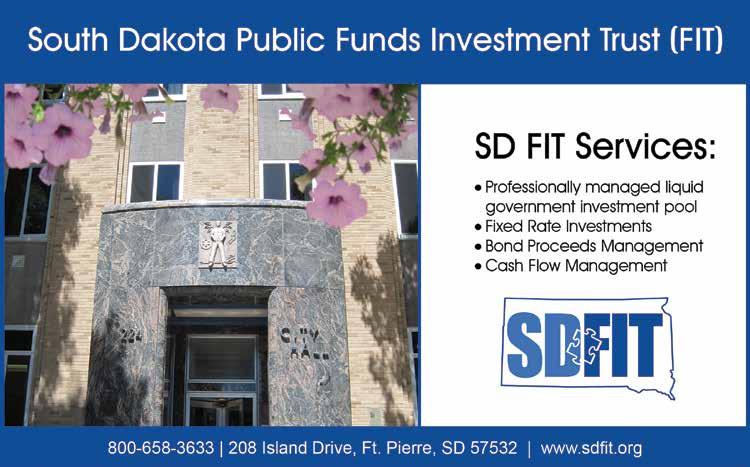
Serves as liaison with staff, customers, consulting engineers, contractors, developers, other utility systems and governmental agencies. Also responsible for writing and maintaining Operator Qualifications Plan, Integrity Management plans and Operation and Maintenance Manuals to comply with state/federal codes and training employees to meet plan requirements. 10 years certified journeyman natural gas experience required. Engineering degree preferred. Salary commensurate with experience/qualifications. Excellent benefits and GREAT work culture! Learn more and apply at www.watertownmu.com. Closes August 15. EOE.
HR/Risk Coordinator – Watertown Municipal Utilities, Watertown, SD. Responsible for planning and directing the human resource activities of the organization, including recruitment, training, safety, processing payroll, wage, benefit and pension administration, insurance programs, labor relations, policy development and interpretation, drug/alcohol and workers compensation program administration and performance management. Also responsible for maintaining records for the risk prevention program and filing claims for auto and property damage. Full job description and application form available online at www.watertownmu.com. Open until Aug. 20. EOE.
Junior Finance Officer - City of Wessington Springs, SD. This position is a trainee role for the future position of Finance Officer. Among other duties, they will assist the Finance Officer in overseeing the City’s accounting and administrative functions including utility billing, budgets, receipts, disbursements, investments, banking, payroll, auditing, internal controls, ordinances, contracts, licenses/permits, insurance, inventories, zoning, elections, human resources, state and federal compliance reporting and record keeping. Position description and applications are available at the City Office, online at cityofwessingtonsprings.com, or by calling 605-539-1691. Send application and/or resume, cover letter, and references to PO Box 443, Wessington Springs, SD 57382, or email to wessprsd@venturecomm.net. Open until filled. EOE.

Maintenance Operator, Class III – City of Hot Springs, SD. Skilled position performing streets, parks, and cemetery maintenance. Responsible for performing street and park maintenance including, but not limited to, operating hand tools, power tools, regular duty trucks, loaders, bobcats, blades, street sweeper, plow trucks, semi-truck, water truck, etc. It is expected of this position to also be able to perform carpentry and masonry related tasks in addition to metal fabrication. Starting wage: DOEQ $15.55-19.44/ hr. For a complete job description, application, and benefit listing, visit www.hs-sd.org and search city employment opportunities. You may mail or drop off your application at City Hall 303 N. River St. Hot Springs, SD 57747 or email to streets@hs-sd.org or hscityadministrator@hs-sd.org. Open until filled.
Patrol Officer – City of Pierre, SD. Performs law enforcement & public safety duties as necessary to maintain law & order in the City of Pierre. Must be at least 21 years of age, have a high school diploma or GED, & pass the police entry level examinations including a background investigation. Prior experience in law enforcement is desirable. Certified officer preferred. Up to $2000 annually for educational reimbursement. Up to $6000 hiring bonus. Comprehensive benefit package. Learn more and apply: Human Resources Office, City of Pierre, Box 1253, Pierre, SD 57501, (605)773-7429, www.cityofpierre.org. Open until filled. EOE.
Patrol Officer - City of Mitchell, SD. Responsible for the enforcement of federal, state, and local laws and the protection of life and property. Some of the job duties include: patrol the city to detect and deter criminal activity and traffic violations and to provide assistance as needed; monitors commercial and residential areas for signs of criminal activity; responds to calls for service, including domestic disputes, assaults, burglaries, traffic accidents, lost or missing persons searches, public service requests; completes required reports and forms, including accident and incident reports. Starting wage: $27.386 per hour plus benefits. $3,000 relocation stipend. To receive the stipend you must move within 25 miles of the City of Mitchell. Pay increase after 6 months of employment and another pay increase after 1 year. Applications at www.cityofmitchellsd.gov. Open until filled.
Police Officer – City of Box Elder, SD. Join our team at the City of Box Elder, where we're seeking dedicated individuals to uphold our commitment to excellence, teamwork, and respect. As a member of our highly trained and professional force, you'll play a crucial role in enforcing federal, state, and local laws while safeguarding the lives and property of our community members. Starts at $27.14 hourly depending on experience and qualifications. Generous paid time off program, 10.5 paid holidays per calendar year and excellent benefits which include employer paid health, dental, and vision, and life for the employee, along with enrollment in the South Dakota retirement plan. Learn more and apply at the Human Resources page at www.boxeldersd.us. Open until filled.
Police Officer - City of Spearfish, SD. Enforce local, state, and federal laws, prevent, and suppress crime and accidents, and promote public safety through community policing principles. Responsible for the investigation of criminal cases as assigned. Requirements: Knowledge and level of competency commonly associated with completion of specialized training in the field of work, in addition to basic skills typically associated with a high school education; possession of or ability to readily obtain South Dakota Law Enforcement Certification. Full-time position. Starting wage: $30.13 per hour. Competitive benefit package. $6,000 signon bonus. Housing allowance. Full description and apply at www. cityofspearfish.com. Open until filled. EOE.
Police Officer (Entry Level/Lateral Entry) - City of Vermillion, SD. Duties include performing varied assignments in motorized patrol,
traffic control and enforcement, accident investigation, preliminary and follow-up investigation at crime scenes, and assisting in public safety education programs. To learn more about the police officer position and to complete an application, please visit the City of Vermillion's job page: https://www.vermillion.us/Jobs.aspx or if you have questions about the position please call/email Jack Baustian at 605-677-7050 or jackb@cityofvermillion.com. Open until filled.
Public Works Director (part-time) – City of Delmont, SD. Performs work in maintenance of all phases of water distribution and supply, wastewater collection system and lagoon, maintenance and repair of streets and alleys, maintenance of parks, dump ground, any and all city property. Questions: Barb Dozark, 605-779-2621, delmontfinance@midstatesd.net. Application and resume may be sent to: Delmont Finance Office, PO Box 202, Delmont, SD 57330. Open until filled.
Public Works Director – City of Fort Pierre, SD. Provides technical assistance that will impact decisions on the day-to-day distribution of the workload of field staff, tactfully handles engineering related questions or problems, works with the City Superintendents, Assistant Public Works Director, or other staff for resolution of such issues. Maintains a professional presence and respectfully answers questions by staff and general public. $2,000 Hiring Bonus. Minimum starting salary $90,000/yr negotiable depending on qualifications and certifications, plus excellent benefits. Learn more and apply at www.fortpierre.com (Employment Opportunities). Open until filled.
Public Works Employee - City of Wessington Springs, SD. Class B commercial driver’s license required or obtained within 60 days. Subject to drug and alcohol testing. Desired qualifications are Class I Water Distribution, Class I Wastewater Collection, Class I Wastewater Treatment, and Class II Water Treatment certificates or obtained within one year. Will help street and electric departments as needed. Excellent benefit package including SD Retirement, health, vision & dental insurance, AFLAC, and PTO. Salary dependent on experience and qualifications. Applications available at cityofwessingtonsprings.com, City Hall, or 605-5391691. Open until filled. EOE.
Public Works Maintenance – City of Philip, SD. Assist in all phases of maintaining the city streets, water distribution and wastewater system. Assist with the maintenance of public buildings and open spaces including the airport, rubble site and swimming pool. Knowledge and experience with all types of equipment is desired. Must hold a valid SD driver’s license. State water and wastewater certifications, and pesticide license must be obtained within two years of employment. Full time position. Wage DOE with an excellent benefit package. For more information, contact City Administrator Brittany Smith at 605-859-2175 or cityadmin@ philipsd.us Job description and applications at https://www. philipsd.us. Open until filled. EOE.
Senior Water Plant/System Specialist – City of Pierre, SD. Responsible for leading and participating in specialized technical work at the municipal water treatment plant, distribution system, and related facilities of the raw and potable water system. Leads other Water Plant/System Technicians in the operation and repair of the state-of-the-art water treatment facility, including water

sampling, testing, treatment, repair, maintenance and operation of pumps, wells, and motors. Also, will be the lead in compliance testing and monitoring to ensure that all state and federal regulations are met. Wage offer will be based upon actual education and experience. Comprehensive benefit package. Up to $2000 annually for educational reimbursement. UP TO A $3,000 HIRING BONUS! Learn more and apply at www.cityofpierre.org. Open until filled.
Staff Engineer – City of Pierre, SD. Assists City Engineer in providing technical services related to City of Pierre infrastructure projects. Responsible for preparation and administration of annual construction and materials contracts. Also assists Building Officials in plan review and issuing Building Permits. Duties include project feasibility analysis, infrastructure analysis & planning, infrastructure cost estimating, municipal infrastructure project design & review, and construction project administration. Comprehensive benefit package. Up to $2000 annual educational assistance available. Wage offer will be based upon actual education and experience. UP TO $3000 HIRING BONUS! Learn more and apply at www. cityofpierre.org. Open until filled. EOE.
Traveling Code Enforcement Officer - Code Enforcement Specialists. Code Enforcement Specialists, a rapidly growing independent company specializing in code enforcement for small and medium sized communities, is looking for an individual willing to do some travel and perform code enforcement services. Excellent pay and hours are flexible. Experience is not necessary, but a background in law enforcement would be helpful. On-the-job training is provided. Please inquire at (605) 208-0786 for details.
Senior Water Plant/System Specialist – City of Pierre, SD. Responsible for leading and participating in specialized technical work at the municipal water treatment plant, distribution system, and related facilities of the raw and potable water system. This is a lead position responsible for leading other Water Plant/System Technicians in the operation and repair of the state-of-the-art water treatment facility, including water sampling, testing, treatment, repair, maintenance and operation of pumps, wells, and motors. Will be the lead in compliance testing and monitoring to ensure that all state and federal regulations are met. Learn more and apply at www.cityofpierre.org. Open until filled.
Street Mechanic – City of Pierre, SD. Work consists of diagnosing, troubleshooting, and performing preventive maintenance on vehicles and equipment. Welding and inventory management experience beneficial. Must have possession of or ability to obtain a Class A CDL with air brakes and tanker endorsements and be able to work in inclement weather conditions. Comprehensive benefit package. Up to $2000 annual educational assistance available. Wage offer will be based upon actual education and experience. UP TO A $3,000 HIRING BONUS! Learn more and apply to City of Pierre Human Resources Director, P.O. Box 1253, Pierre SD 57501, (605) 773-7429, www.cityofpierre.org. Open until filled. ■
July 2024 issue, page 13
“Nominations Open for SDML Hall of Fame, Due Sept. 15”
The article incorrectly stated that the SDML Hall of Fame has been inducting worthy members since 2009. The inaugural year of the Hall of Fame took place in 2010.

18 19 20 21 22 23 24
25 26 27 28 29 30 31
No later than August 1 – The liquor tax reversion must be made. (SDCL 35-522; See Hdbk., sec. 11.600)
No later than August 1 – In those municipalities employing a city manager, the city manager is required to prepare and submit an annual
budget to the governing body. (SDCL 9-10-15(5); See Hdbk., sec. 12.065)
Sales tax ordinance deadlines – The effective date of any new or amended municipal sales tax ordinance must fall on either January first or July first. The municipality must notify the Department of Revenue of the ordinance at least 90 days prior to the effective date. (SDCL 10-52-9; 10-52A-13; See Hdbk. Sec. 12.260)
On or before September 1 – The finance officer must report annually to the governing body an estimate of the expenses of the municipality and likewise the revenue necessary to be raised for the current year in budget form similar to that recommended by the municipal accounting manual as
provided in SDCL 4-11-6. (SDCL 9-2223; See Hdbk., sec. 12.065)
At the first regular meeting in September, or within ten days thereafter – The annual appropriation ordinance for the ensuing year must be introduced. (SDCL 9-21-2; See Hdbk., sec. 12.066)
Boundary changes – Municipalities must notify the Department of Revenue of any resolution or amendment enacted which changes the boundaries of the municipality. Notifi cation shall be in written form, shall contain a copy of the resolution or amendment, and may be sent by electronic means or registered mail. Municipalities shall also provide any changes and additions to streets and addresses. (SDCL 10-52-13; See Hdbk., sec. 14.172) ■








“Financial plans are more than just about money. They’re really about education and providing you with the knowledge you need to make the best decisions for your community.”
Miranda Kleven, PE, AE2S Special Projects Engineer










Sept 2024
16 17 18 19 20 21
22 23 24 25 26 27 28 29 30
On or before September 1 – The fi nance offi cer must report annually to the governing body an estimate of the expenses of the municipality and likewise the revenue necessary to be raised for the current year in budget form similar to that recommended by the municipal accounting manual as provided in SDCL 4-11-6. (SDCL 9-2223; See Hdbk., sec. 12.065)
Before September 2 – If the number of on-sale and off-sale liquor licenses is
not fixed by ordinance, the governing body may determine by resolution the number of on-sale and off-sale liquor licenses and the fees to be charged for each. (SDCL 35-4-11; See Hdbk., sec. 11.205)
First Monday of September – Labor Day – State holiday (SDCL 1-5-1)
At the first regular meeting in September, or within ten days thereafter – The annual appropriation ordinance for the ensuing year must be introduced. (SDCL 9-21-2; See Hdbk., sec. 12.066)
On or before October 1 – The governing board of any municipality may, on or before the first of October preceding the annual municipal election, approve an ordinance requiring a runoff election as found in SDCL 9-13-27.1 and SDCL 9-13-26.1 (SDCL 9-13-25; See Hdbk., sec. 7.600)

On or before October 1 – Immediately upon passage and publication of the annual appropriation ordinance, the auditor or clerk must certify the tax levies contained therein to the county auditor on or before October first in the following form:
For general purposes___________
For interest and debt service fund__ (SDCL 9-21-20 and SDCL 10-12-7; See Hdbk., sec. 12.066)
Boundary changes – Municipalities must notify the Department of Revenue of any resolution or amendment enacted which changes the boundaries of the municipality. Notifi cation shall be in written form, shall contain a copy of the resolution or amendment, and may be sent by electronic means or registered mail. Municipalities shall also provide any changes and additions to streets and addresses. (SDCL 10-52-13; See Hdbk., sec. 14.172) ■




